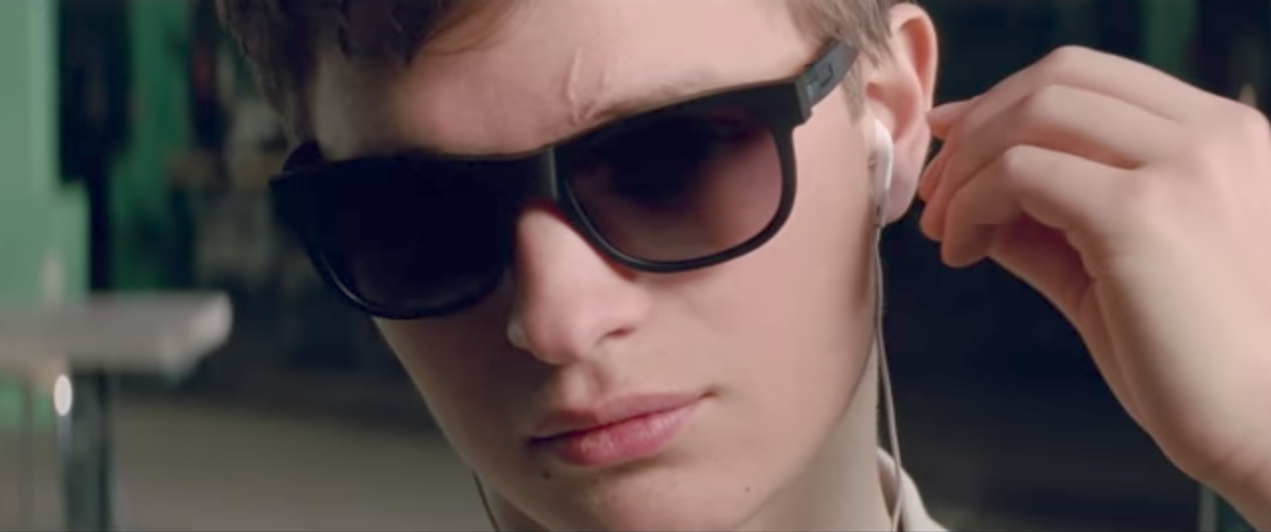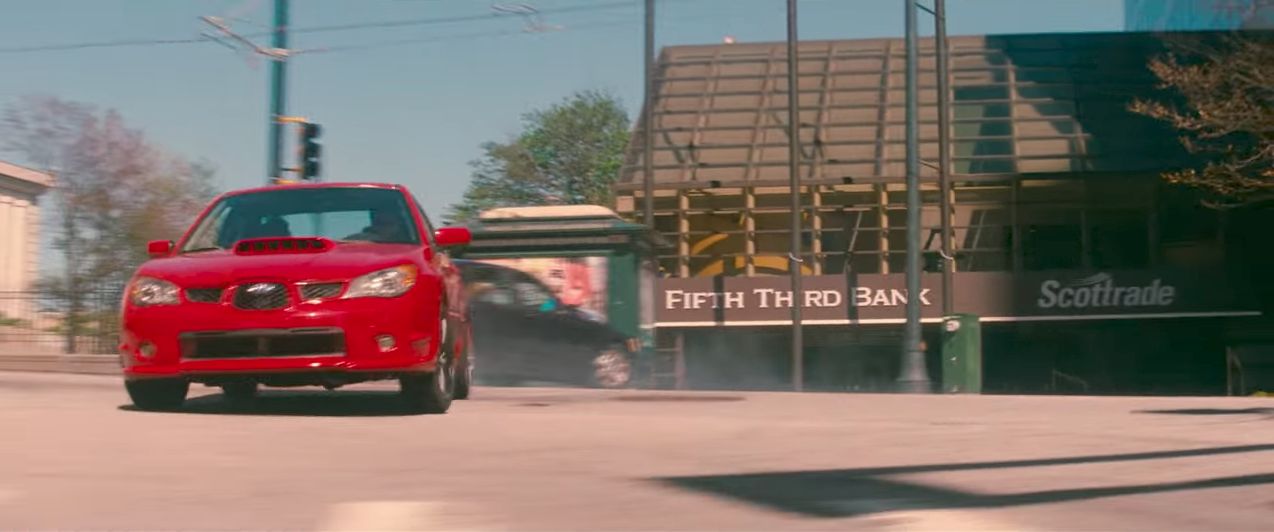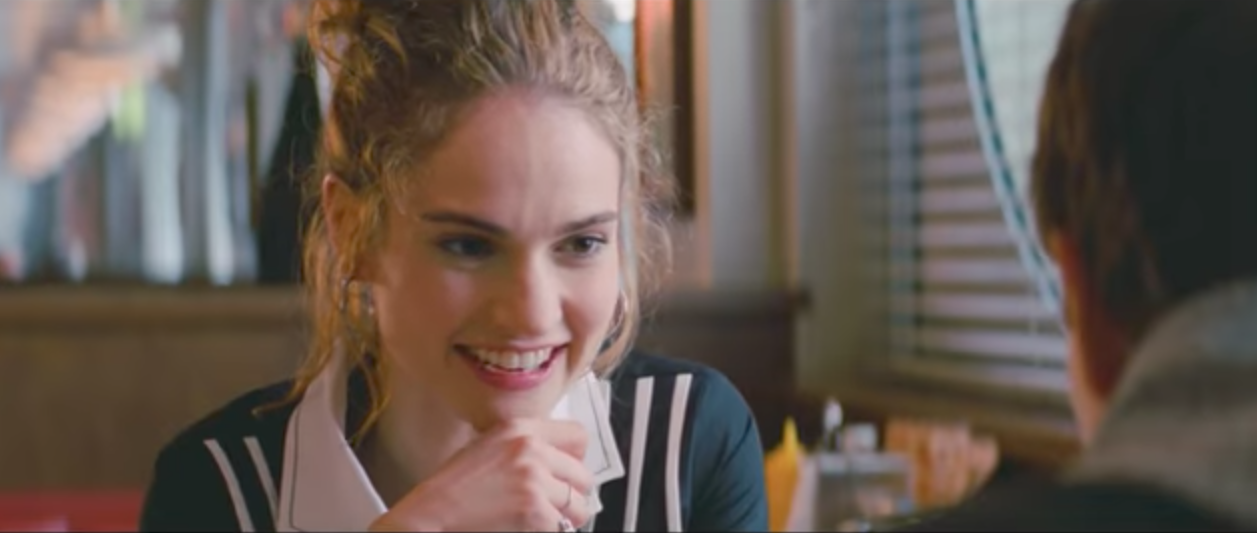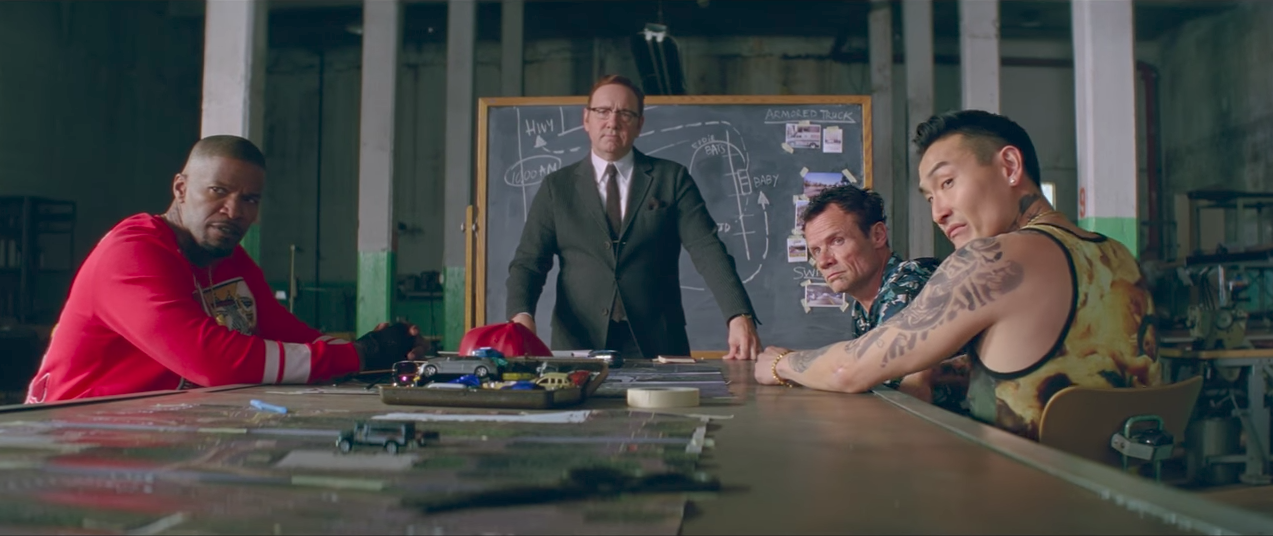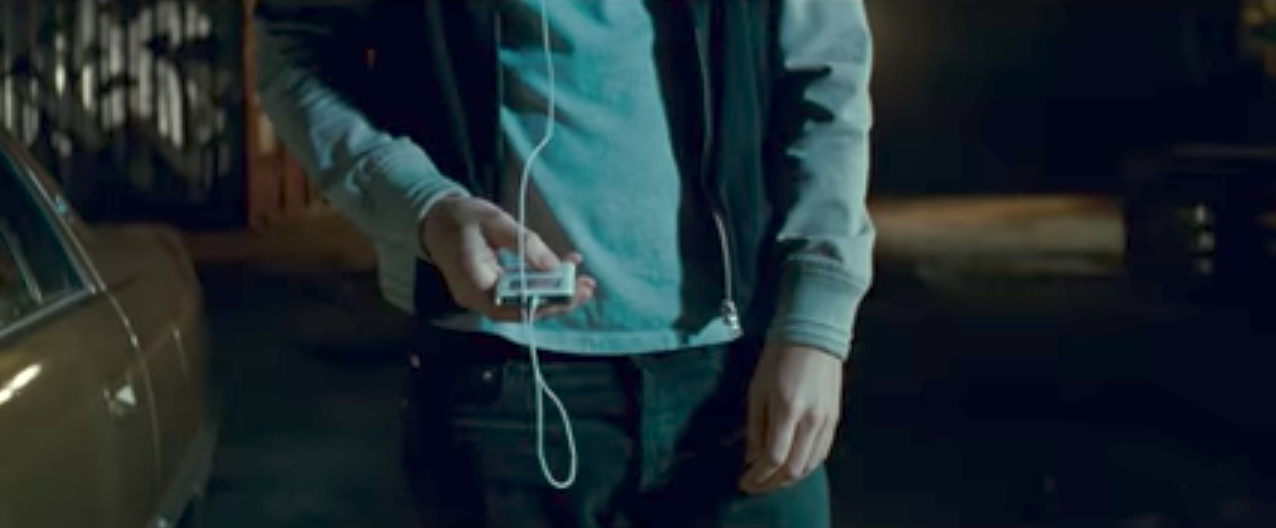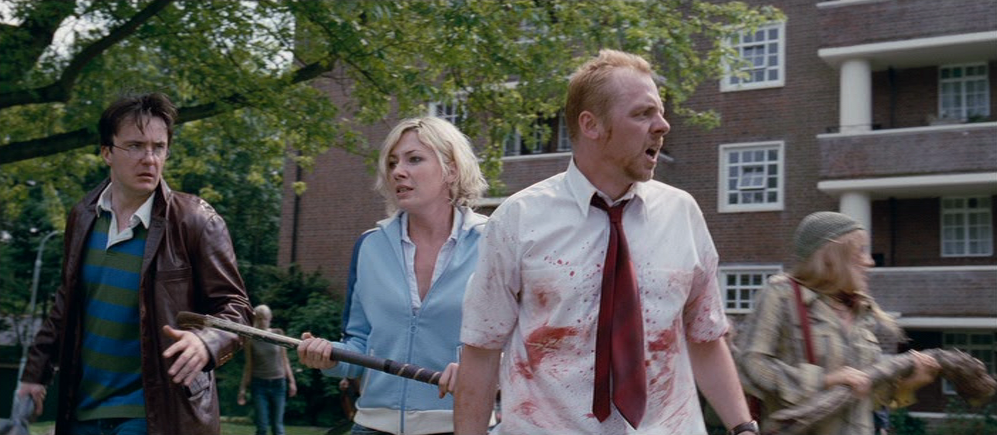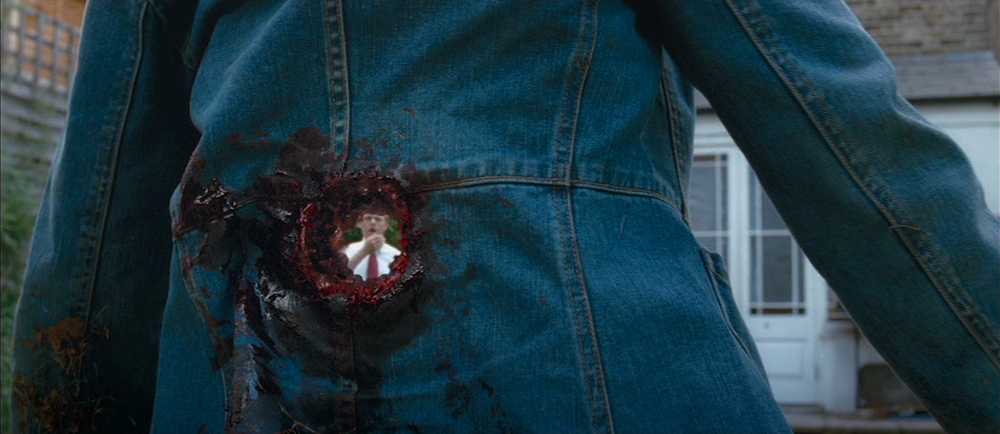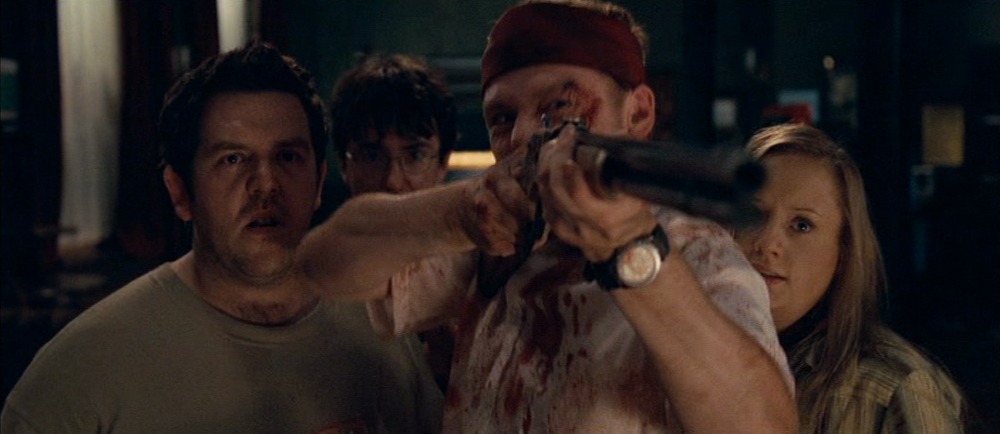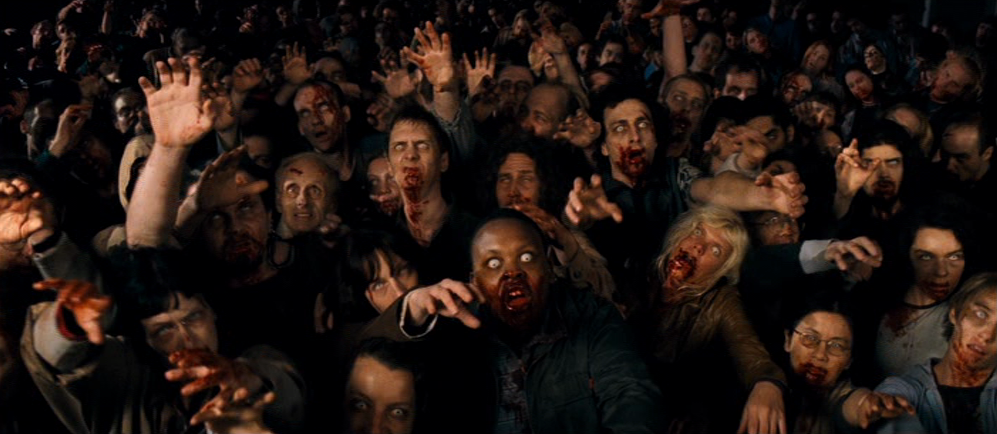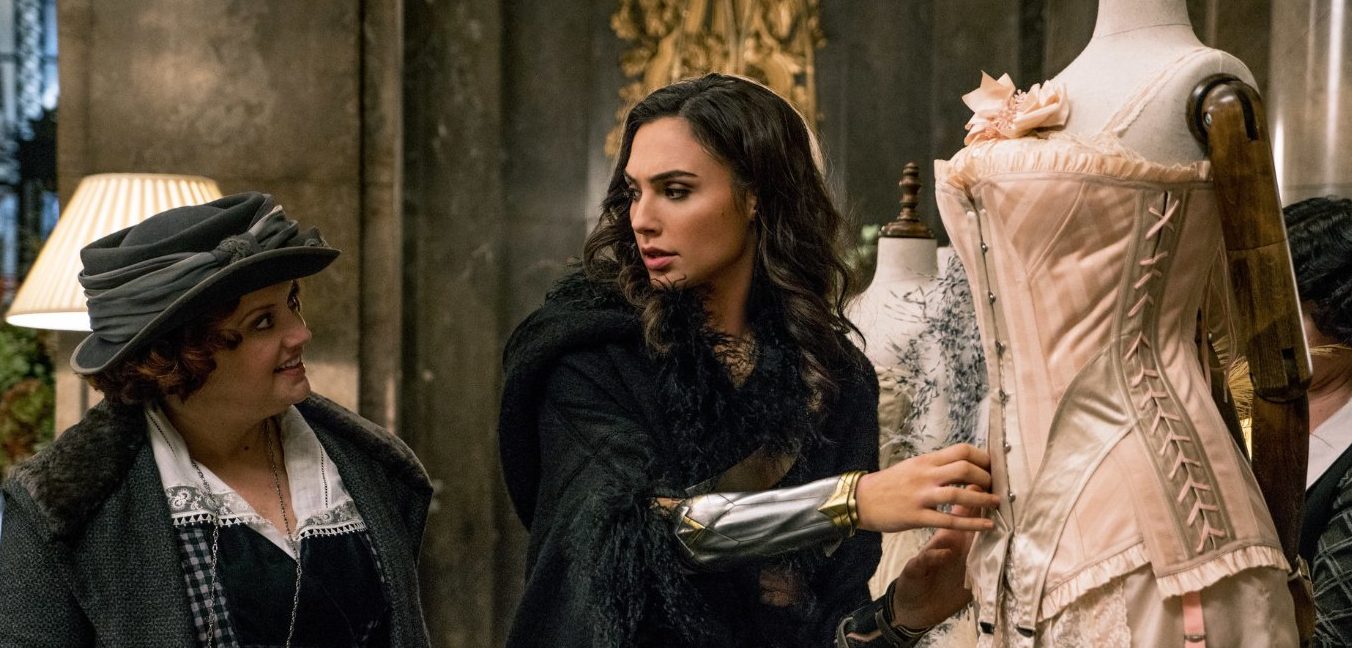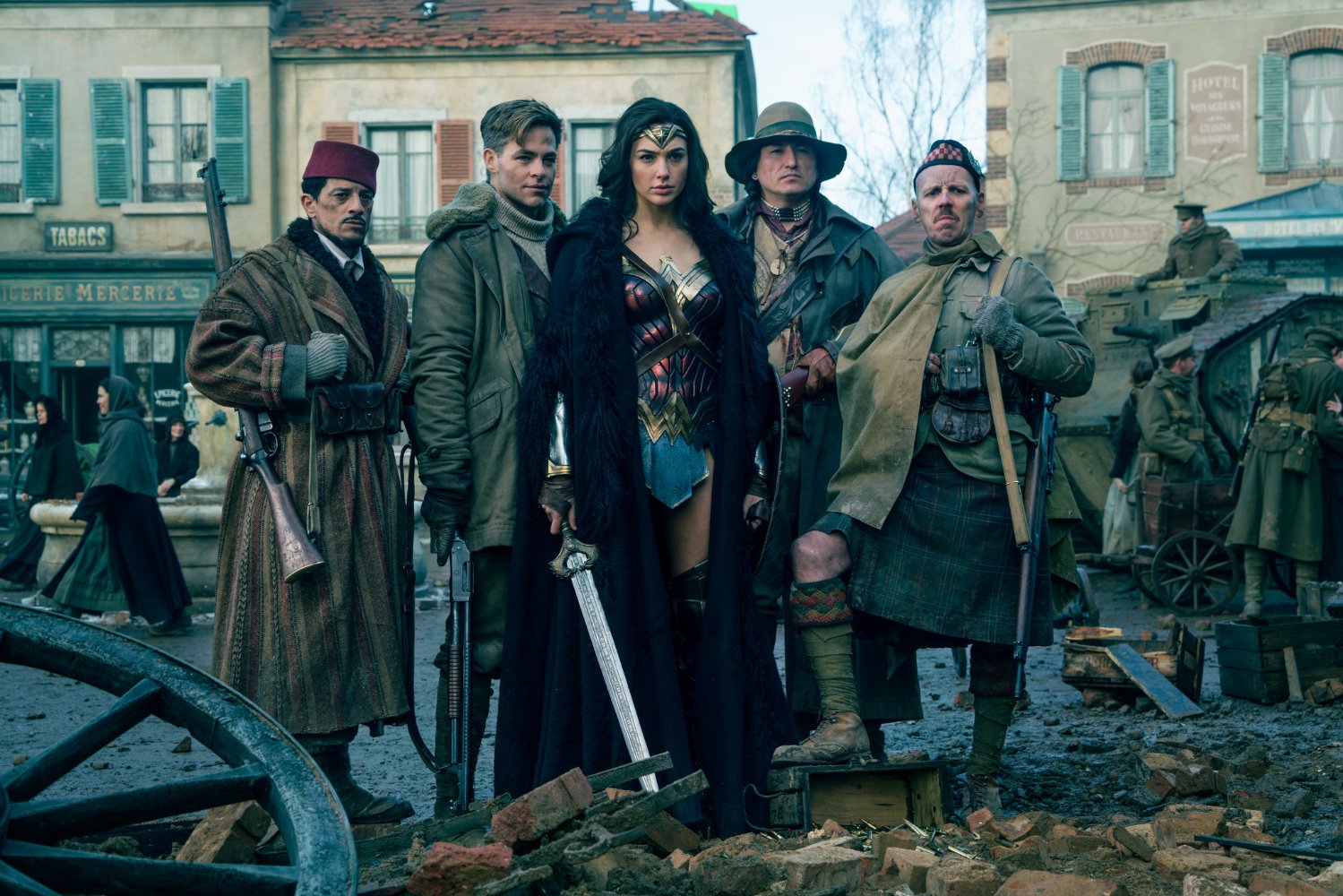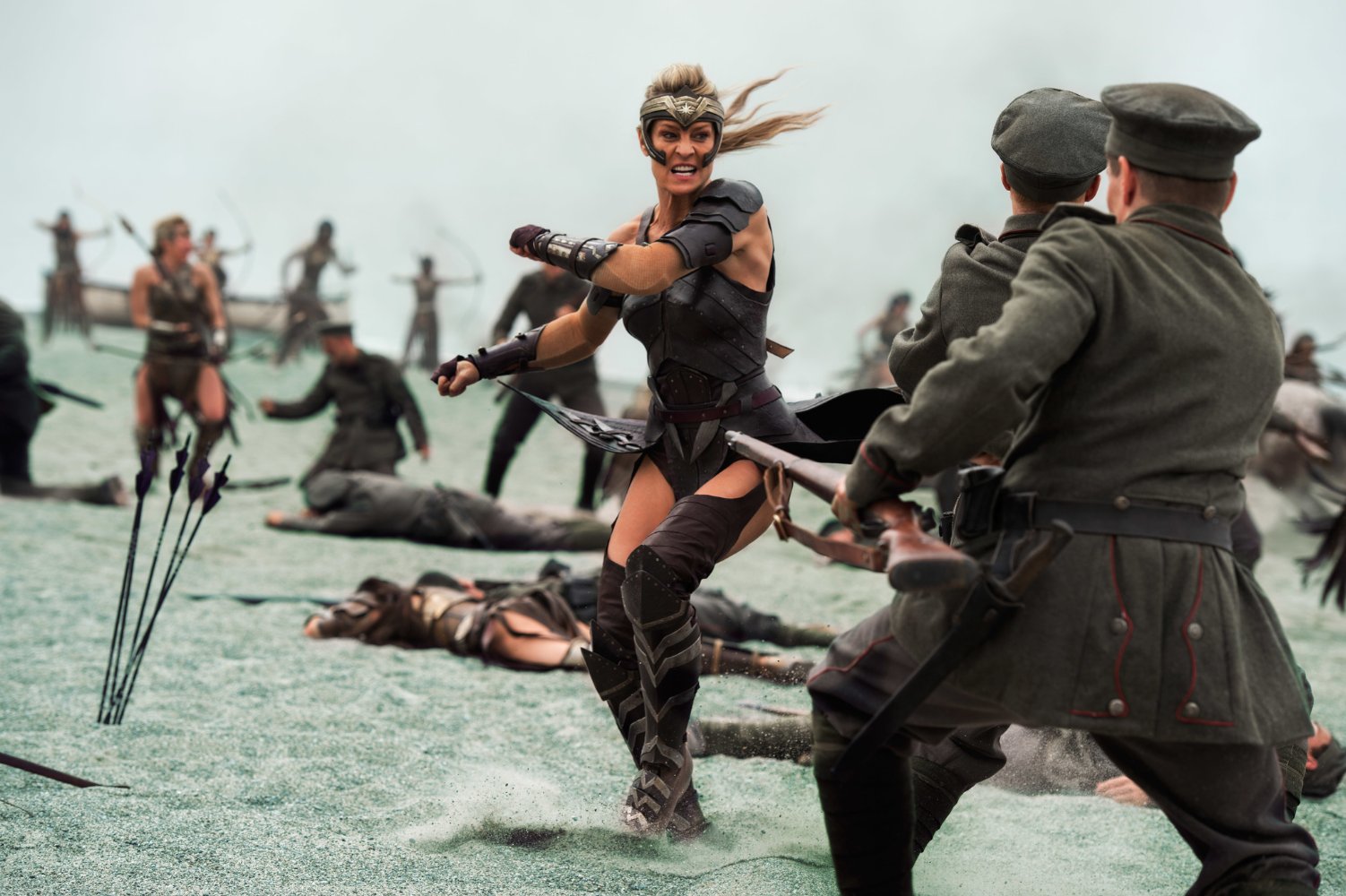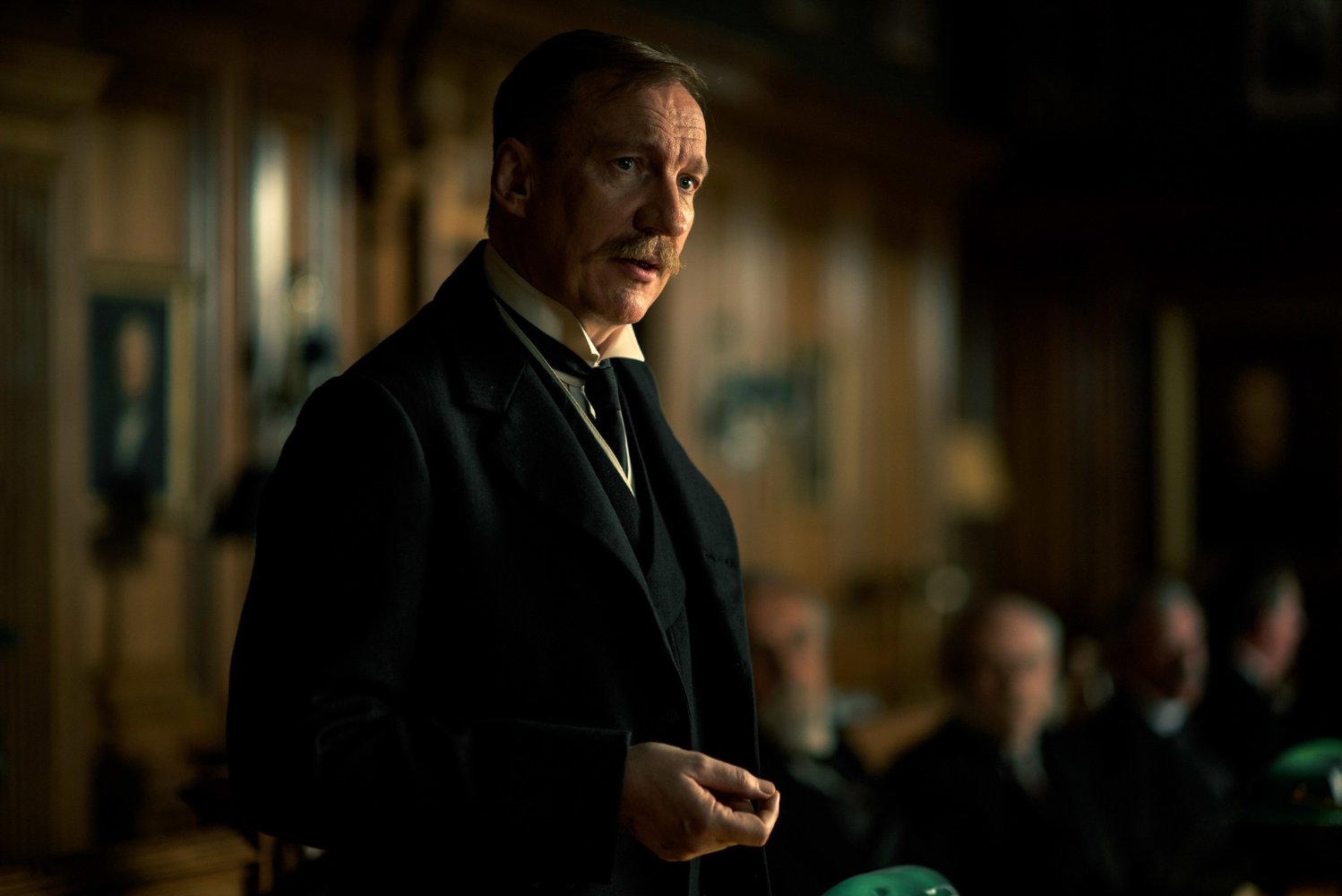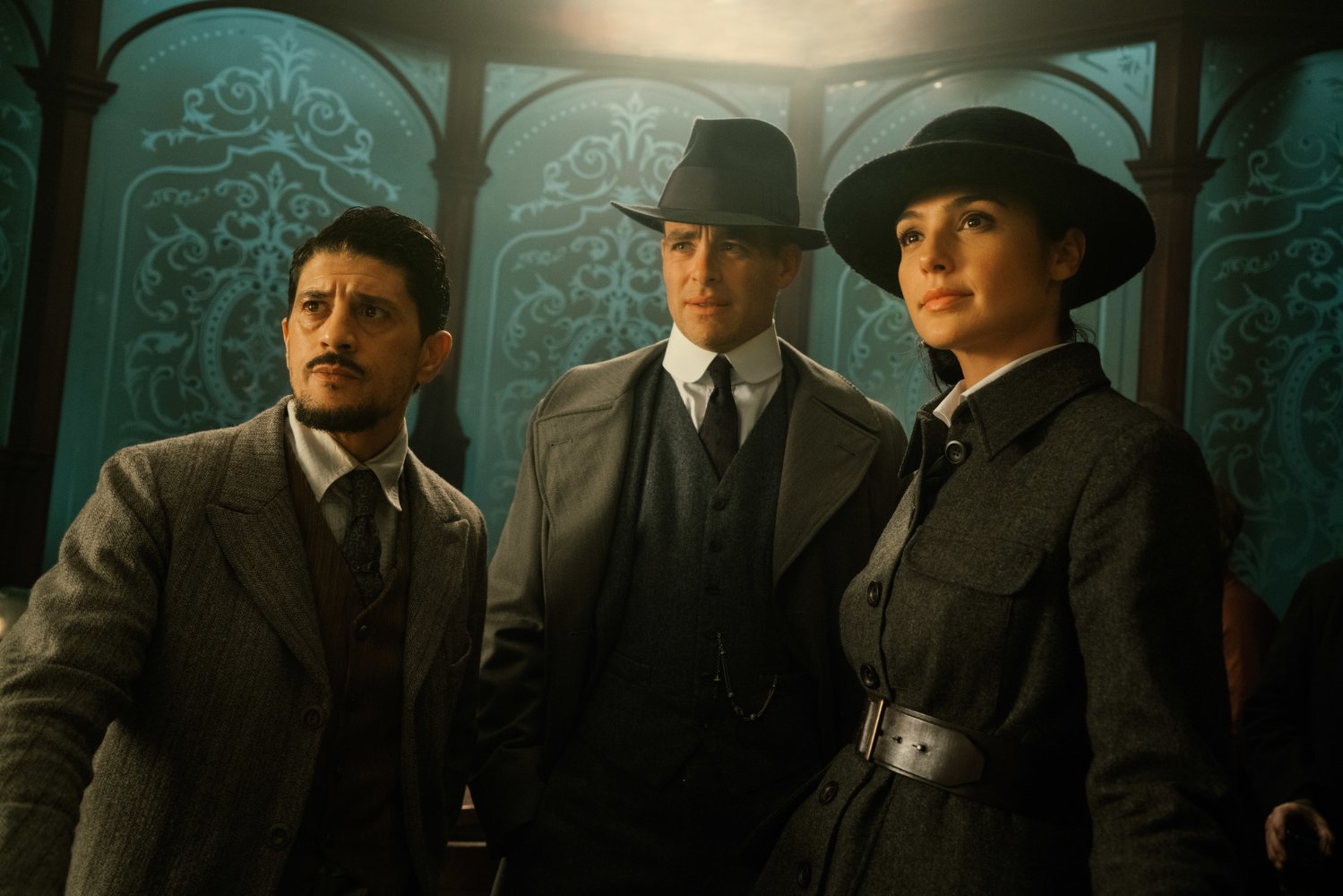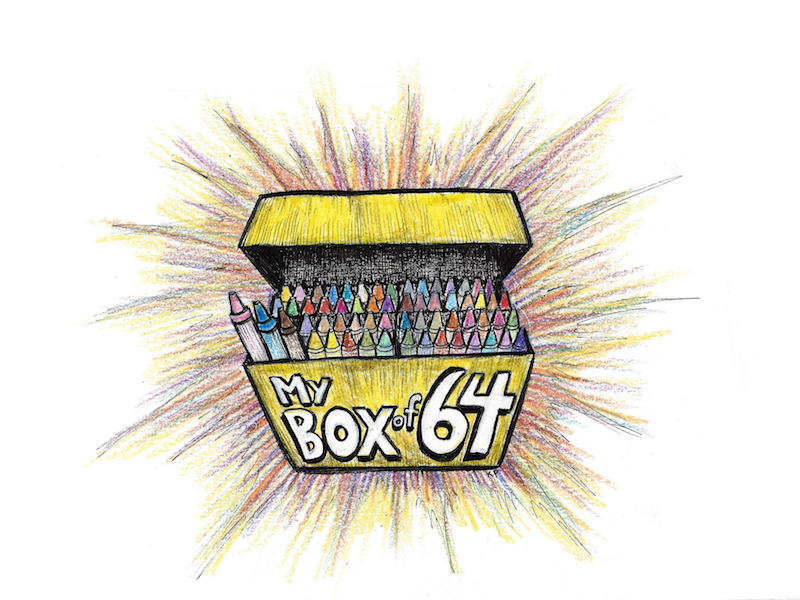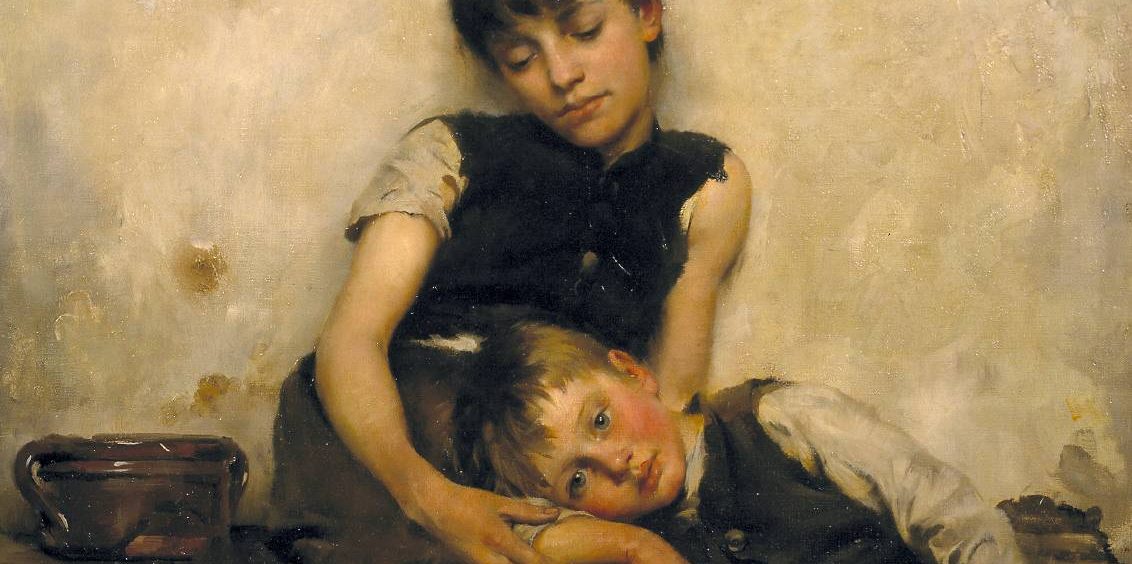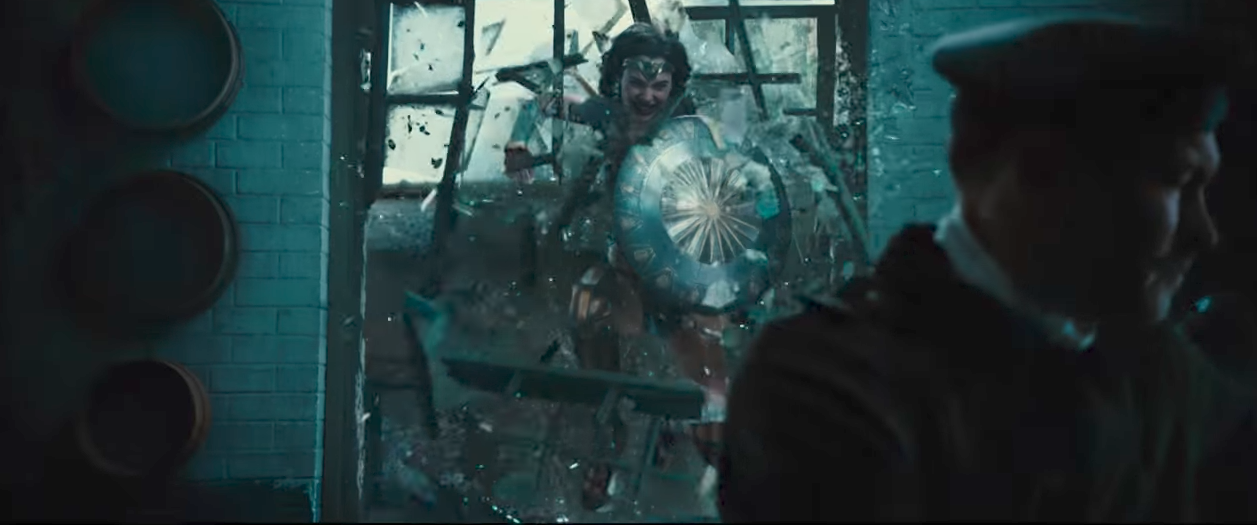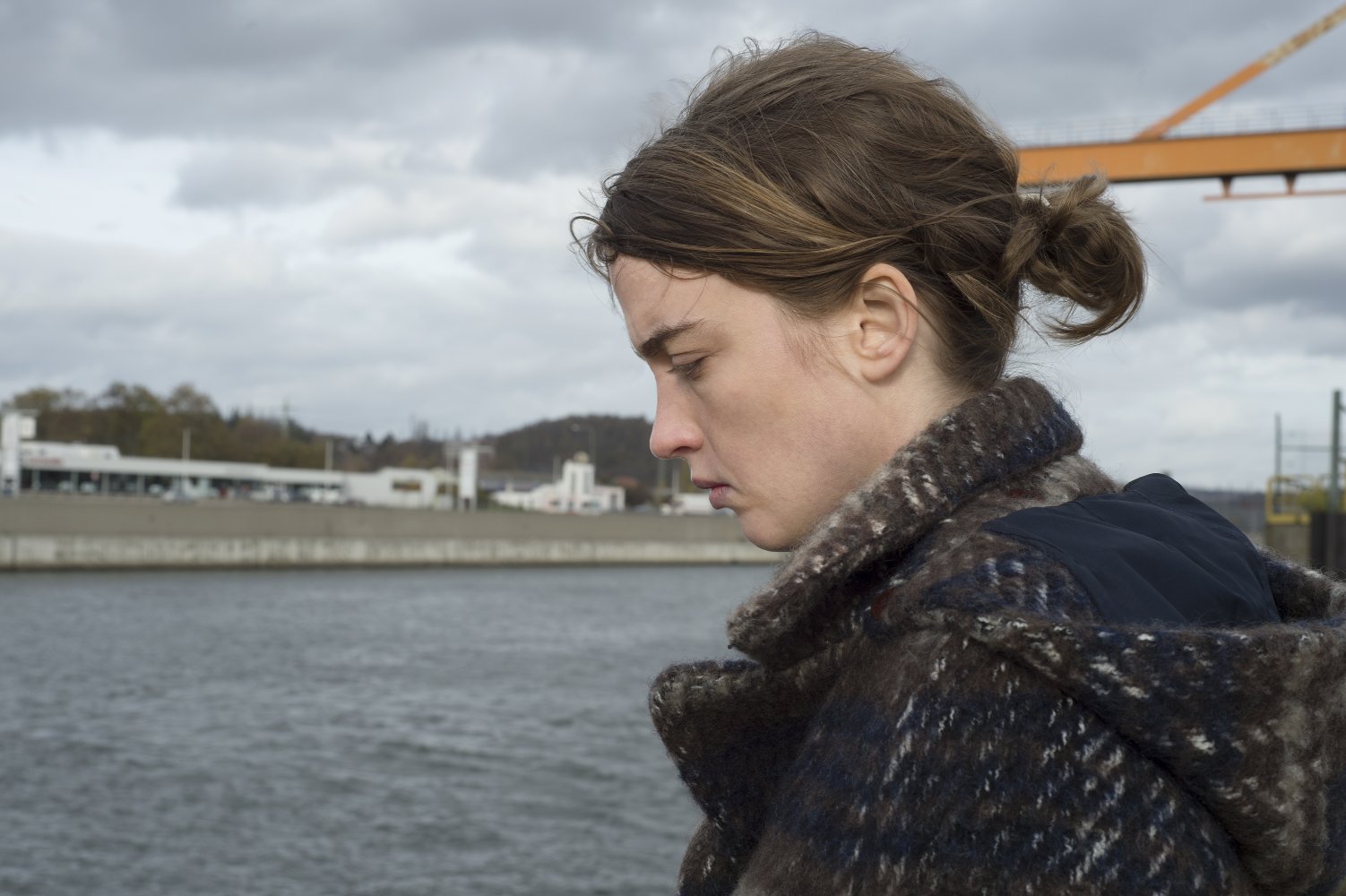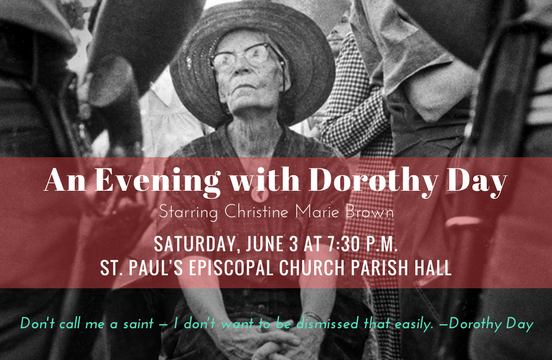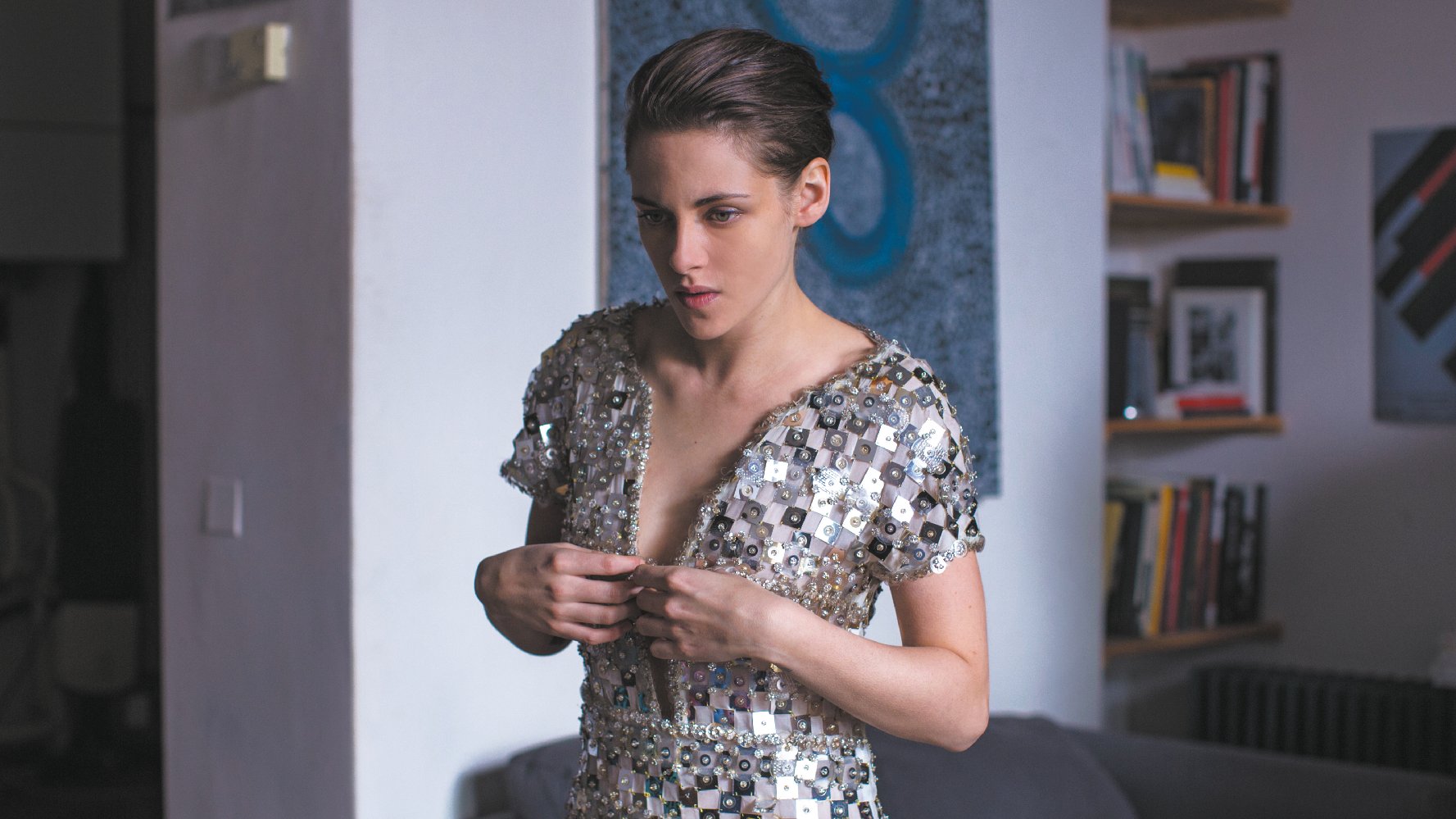Baby Driver (2017) - a review and mixtape
[This review is made possible by the Looking Closer Specialists — a generous crew who support this website. Thank you, Specialists, for understanding the time and resources that are necessary to keep a site like this alive. You are my best audience, and more: you are partners and friends.]
•
Pro tip: If you go see Baby Driver — and you should — stay in your theater seat until the end credits are finished. No, not because there's a post-credits surprise (there isn't). Not because there are so many important matters to reflect on and discuss (there aren't). Hang out in the theater lobby a while because no road within a 10-mile radius of a theater showing Baby Driver is safe. Let your fellow moviegoers go to their cars, gun their engines, run the red lights, mistake the interstate for a racetrack, and forget the difference between the movie and make-believe.
I started noticing, all the way back in high school, while Die Hard was still in theaters, that the power of movies to draw us into its protagonist's point of view can have an effect on a viewer's energy and physicality. I came out of Die Hard feeling like the smug, sarcastic John McClane. I walked differently. I smiled differently. Recently, I left Paterson feeling like I was the title character: taking life at a slower, more observant pace, absorbing light and color and beauty all around me.
And I came out of Baby Driver wanting to blast my favorite freeway playlist and push the speed limit all night.
It's a dangerous influence, this power. Be aware of it in yourself. Be aware of it in those around you. Love is contagious. Movies love things. They want you to love them too. So it's always good to ask: This movie that you're seeing — what does it love?
Writer/director Edgar Wright has made a lot of movies in a lot of genres. Shaun of the Dead is a brilliant spoof that beats most zombie movies at their own game. Hot Fuzz does the same thing for buddy-cop movies. The World's End is a hilarious send-up of alien invasion films. And Scott Pilgrim Vs. The World is a colorful, innovative comic book adaptation. They're all fast-paced, they're all funny, and they all run like well-oiled machines: engines of action fueled with comedy, engines of comedy fueled with action.
Like Guy Ritchie, Wright is master of energy: He knows how to weld imagery and music together with precision editing so that every movie feels like a ride in a high-end race car driven by a champion. But Wright is smarter than Ritchie, funnier, and he spends more time packing more ideas into a space than it seems likely to hold, making his films far more rewarding for repeat viewing.
So, for fans of Wright's oeuvre, Baby Driver amounts to two hours of saying, "Well, of course he made a movie about a getaway car driver whose mastery of machines is made possible by music."
Let's get our spoiler-free synopsis out of the way so we can get to what really matters:
Baby — played by Ansel Elgort (the kid who made all the girls swoon during The Fault in Our Stars) — is the reluctant driver of a getaway car for a gang of bank robbers. And he's willing to do "one last job" (of course), because he owes it to the team's mastermind (a wonderfully understated Kevin Spacey).
Yeah, right. As any fan of heist movies, gangster movies, or stories about reluctant crooks will know — there's no such thing as "one last job."
And so, surrounded by volatile thieves who distrust his method — he always wears his earbuds because his magic behind the wheel flows from the music in his myriad mixtapes and iPods — Baby maneuvers to make his escape from a life of crime. While his past is scarred by the death of his mother (every superhero has his wound), Baby still has a lot to live for — namely, a caring and hard-of-hearing foster father (CJ Jones) and a pretty waitress (Lily James, looking like a cosplay version of the Double-R Diner's Shelley from Twin Peaks).
But, well, you know how these things go.
Except you don't. It's exactly in the "how this thing goes" that Baby Driver becomes exceptional.
The cast is winsome and clever. Although they lack the chemistry that made Wright's "Cornetto Trilogy" films, so satisfying, each one of them gives it their all. Elgort is fine, but it's hard not to shake the sense that Wright might have hoped for a star with more charisma. (A few years ago, Joseph Gordon-Levitt would've been perfect. And I can see Get Out's Daniel Kaluuya knocking this out of the park.) Lily James makes me want to fall for Deborah, Baby's sweetheart; it's not James's fault that her role needs more substance and purpose. Jon Hamm fares best, playing a hired gun whose volcanic temper is just waiting for its moment. You can count on Hamm earning more supervillain roles. Eiza González, as Hamm's decorative partner-in-automatic-weapons, gets the second insufficiently envisioned female role. And Jamie Foxx plays some muscle who boasts of "mental problems" — a promise that the movie never really fulfills.
A supporting cast of musical legends spice up the stew: Flea, Killer Mike, even Paul "The Rainbow Connection" Williams. Their characters collide in unpredictable and amusing ways, filling the story with surprises — including a surprisingly anticlimactic showdown that keeps its characters contained in a parking garage just when you're ready for the biggest, best chase scene of all time.
And yet, for all of its faults, Baby Driver keeps the audience securely seat-belted into its exhilarating amusement-park ride by knowing what it loves, and by loving that thing well. What does this movie love? It loves music. It loves choreographing everything from incidental moments (like Baby's walks from Point A to Point B) to its heart-in-your-throat action scenes precisely to the beat of its brilliant playlist.
And, if you're listening, you'll notice that its greatest innovations occur as Wright calibrates the noises of sirens, squealing brakes, even gunshots to participate in its pop-to-punk playlists, bringing new bursts of inspiration to familiar tracks.
That, I believe, is the movie's most redeeming influence: It sharpens our awareness of the symphony of sound all around us, and how it serves as both an inspiration for, and an extension of, the songs that engage our adrenaline, that awaken our creative capacity.
If you look closely enough, you might glimpse within Baby Driver the story of a mad genius filmmaker stuck in the corporate machine, wanting to be turned loose to do his best work without criminal compromise. Is it worth mentioning here that Edgar Wright was making Marvel's Ant-Man and had the studio take it away from him over creative differences? Watching Baby Driver, I wished even more that I could have seen that Ant-Man movie.
But maybe it's for the best. Maybe we don't need Edgar Wright focusing his energies on a huge corporate franchise. Maybe we need his stories, his characters, his playlists, his hands on the wheel and his heartbeat pounding through the subwoofers.
•
And so, rather than unleashing my post-Driver delirium behind the wheel, I'll turn it loose in a playlist.
Baby's playlists are heavy on nostalgia: Queen, The Damned, The Beach Boys, "Harlem Shuffle," and, in the film's most inspired musical flourishes, Beck's "Debra" and T-Rex's "Deborah."
Mine? I'm going to respond to Baby Driver with a playlist of my favorite turn-it-up-loud driving music from 2017 so far.
I play these songs for the following occasions:
If I need automatic happiness:
This Is the Kit - "Moonshine Freeze"
https://www.youtube.com/watch?v=435SDzZYz0E
And...
Magnetic Fields - "How to Play the Synthesizer"
https://www.youtube.com/watch?v=xwcKg4-GOSo
And...
Valerie June - Shakedown
https://www.youtube.com/watch?v=cShj4BimPXc
If the news headlines of the day make me feel that all-too-familiar ache of rage and grief...
Algiers - Cry of the Martyrs
And...
Depeche Mode — "Where's the Revolution"
https://www.youtube.com/watch?v=jsCR05oKROA
If I need medicine for my soul...
Elbow - "Magnificent (She Says)"
https://www.youtube.com/watch?v=XQl5KYiiFDI
If I need caffeine and don't have any...
Ibibiyo Sound Machine - Give Me a Reason
https://www.youtube.com/watch?v=ZO769KQ_skE
If I feel like I need to escape under the cover of night...
Rhinannon Giddens - "Julie"
https://www.youtube.com/watch?v=zu5ZYXi6EiE
And...
Feist — "I'm Not Running Away"
https://www.youtube.com/watch?v=_9eUAIPZ43c
If I want one song with a groove good enough to play on "Repeat"...
Laura Marling - "Soothing"
https://www.youtube.com/watch?v=ROiKbckeGIo
Vagabon - The Embers
https://www.youtube.com/watch?v=zTo_Dsa8ijM
If I just want to go fast...
Tinariwen — "Sastanàqqàm"
https://www.youtube.com/watch?v=vACZA9dGvV4
If I want to hang on to that rush of U2's recent Joshua Tree concert...
U2 - "In God's Country"
https://www.youtube.com/watch?v=RFHtHV2bsK4
If I need beauty...
Big Thief - "Mary"
https://www.youtube.com/watch?v=G5OV1JPqlNQ
If I need the Gospel...
The Bruised Hearts Revue — "I Saw the Light"
Shaun of the Disillusioned
Last Friday night, I reminded Anne that it was her turn to pick our date-night movie. This is never a simple task for either one of us. And so, a familiar struggle ensued.
Anne ascended the stairs to browse our film library while I prepared the snacks. She returned with an armload of "possibilities" — the usual pile of twelve or more. That meant it was my job to examine the options and narrow it down. Normally, Anne favors science fiction, fantasy, romantic comedy, or documentaries that focus on natural wonders (Planet Earth, for example). But this time the selections were surprisingly eclectic. They included little-known titles like Aaltra, popular favorites like Napoleon Dynamite, and three Criterion titles: Short Cuts, Punch-drunk Love, and The Burmese Harp.
After I cut the list in half, we discussed the remaining options. And she finally admitted that she had an obvious preference. I might have guessed. And I didn't object. We were tired. We were in the mood for something familiar, something funny, something somewhat frivolous. We were in the mood for Edgar Wright's Shaun of the Dead.
Anne and I first watched this cult-classic zombie movie on my birthday in 2004. I think it was the film's first week in theaters.
I remember being pleasantly surprised by the complexity of Shaun's humor; the confidence of the two leads — Simon Pegg and Nick Frost; the chemistry of the endearing characters in their community; the colorful and detailed locations; the supreme confidence of director Edgar Wright's editing and pacing; and, above all, Wright's ingenious fusion of imagery and music, which made the film feel like a wild ride in a flashy car driven by a professional. This movie has the stylish sizzle of Guy Ritchie's Lock, Stock, and Two Smoking Barrels, but it also proved that even the most incidental details had been carefully devised to reward those paying attention.
Now, here we are — thirteen years and two sequels later. Hot Fuzz and The World's End aren't exactly proper sequels, but Wright crafted those standalone stories with Pegg and Frost as their common denominators and plenty of clever connections to delight the first film's fans. And yes, Wright is still the man. "The Cornetto Trilogy" has far more strengths than weaknesses, and it reveals Wright as a master of invention. Give him a formula and he'll find all kinds of ways to surprise you while remaining faithful to the basic beats. I can't wait to see his latest — Baby Driver — because, as Anne and I revisited Shaun of the Dead, I could see just how many years he has been practicing the kinds of sequences that look likely to be the building blocks of that particular project (in which, quite literally, a professional driver takes his cues from the movie's slick soundtrack).
But this particular run down Shaun's zombie-crowded streets was surprisingly complicated for me — for three reasons.
The first...
...well... it's not exactly new.
Even the first time I saw Shaun of the Dead, I was uncomfortable with its concessions to the genre's demand for scenes of extravagant gore (especially one graphic disembowelment, which seems to be staged to satisfy viewers whose patience for the annoying victim has run out). I have no problem with violent sequences in movies if they contribute meaningfully and artfully to the whole of a vision. But I have always preferred those films that leave much to the imagination over those that indulge in Grand Guignol excesses.
Why? Gore is a standard of the genre, right? Why not just roll with it? Everybody knows it's make believe.
I wish that I could leave it at that. But the fact is that I always feel strange pangs of conscience when big-screen artists treat lightly the image of a human body's destruction, no matter how far that bloodied character might have fallen from our favor. It always feels to me like a kind of pornography, something that fails to contribute to meaning of the whole, and that exists to inspire — at best — a rush of adrenaline and — at worst — a kind of perverse delight at its grisly realism.
And I suspect that this deep-rooted objection to the sight is amplified by another truth: I live in awe of the beauty and complexity and seeming impossibility of the human body. It wounds me to see it disgraced and destroyed. And some of the moments of visible carnage in this film — like those in so many horror films — have given me a sense that I've been harmed by seeing in a way I wouldn't have been harmed by imagining.
I bear scars from a certain scene that I witnessed in an otherwise remarkable 2015 Western starring Kurt Russell and Richard Jenkins: Bone Tomahawk. That film, following in the paces of The Searchers, leads its team of rescuers on a descent into a hell of barbaric and demonic villains that culminates in a scene of graphic dismemberment that I wish I could surgically delete from my memory. If it had been left to my imagination, I could have coped with it better. Nothing in Shaun disturbs me as much as that. To be honest, nothing in The Passion of the Christ disturbed me like that scene.
I feel more than just "Eww, gross" when I witness abuse to the human body. I feel a deep tremor that says "These images are doing you injury."
I find this difficult to understand and explain — but there it is. I'm not saying that all moviegoers should look away or turn it off. I'm not seeking to make moviegoers feel guilty for liking films that include graphic violence. I'm just saying that I am realizing something about my own imagination, and that I want to express it in the hopes of encouraging others to be honest about their own complicated relationships with art. It doesn't mean that you have a weakness if certain kinds of artistic expression do you more harm than good; it's nothing to be ashamed of. Indeed, it might actually be a testimony of your strength. We need to be true to our experiences, and to that subtle voice of conscience that reminds us "All things are lawful, but not all things a profitable. Be wise."
Secondly...
...watching Shaun this time, I realized just how changing times can affect the ways we experience art.
The events of the past year have shown me just how deeply divided my American community has become. They have shown me the intensity of partisan hatred among Americans: the unwillingness of people in one camp to listen to those in another, the eagerness with which we believe the worst about each other (in order to reinforce our sense of correctness), and the frightening capacities we have to brand and condemn whole communities based on ignorance. We are more obviously divided. And we are divided in more ways than ever — chasms widening between rich and poor, right and left, generation and generation, race and race.
In this context, I find that I can't easily laugh off even cartoonish clashes like these — the clashes between the living and the "undead." I'm increasingly skeptical of any art that simplifies a story as a struggle between two camps, one of which is "good" and one of which is "evil." The more life that I experience, the more I see currents of evil running through all of human endeavor, corrupting both sides of any debate, and separating the strong from the weak within any community or category. I can't cheer as Shaun and Company determine that the only reasonable response to the advancing hoard of zombies is to smash them to pieces — even though that's exactly what the zombies mean to do to them.
I've always had a difficult time laughing at how this wacky comedy gets to its "happy ending" ... after forcing characters into scenarios where they have to blast their own family members' heads open with shotguns. No amount of wink-wink genre conventionalism can make me see this anything but a contribution to our problems. Sure — scenes like that are what make this an honest-to-goodness genre movie. Audiences expect those moments. They give these movies a structure within which the artists can distinguish themselves by their variations. But that doesn't diminish the fact that I'm being asked to watch a son pick up a shotgun and blast a hole the size of a Mason jar in his own mother's head, even as he weeps for what has become of her; and then I'm quickly carried past that moment to the next wacky scenario, without further respect for, or reflection on, what has just taken place.
Even if all of this violence is clearly conceived as satire, I wonder: How much more harm than good will a movie like this do if its catharsis speaks to our desire to write off, "block," or otherwise eliminate those factions of people who trouble us? In this climate of violent partisanship, how likely are zombie movies to appeal to our desires to judge and condemn our neighbors on the other side of the fence? Might this genre be appealing to — and, worse, empowering to — those who perceive that people of other races, religions, or political persuasions are merely mindless aggressors?
Yes, Shaun of the Dead shows us other possibilities. It's final moments show a society trying to make good use of the zombies, giving them a meaningful function instead of merely exterminating them. But it felt — this time, anyway — like too little, too late.
Why was Shaun so much easier to enjoy the first time around? Back in 2004, it seemed as though I was watching the film in an entirely different world. I did not feel burdened on a daily basis by the cruelty of American culture. In recent days, I've felt soul-sickened at my fellow Americans' increasing support for acts that increase their own security and safety at great cost to others' human rights and resources. This rising tide of self-centeredness and pride feels like an epidemic that, in the name of militant tribalism and racism, makes people willing to sacrifice honesty, human decency, and community. This nationalism, this sense of religious superiority — it runs directly contrary to the Gospel that I embrace, the Gospel that calls me to open my arms at the threat of violence from others, that tells me not to fear death, that asks me to show love in response to hate, to offer welcome in response to aggression.
If I believe what I say I believe, then I must admit that a philosophy summed up as "Aim for the head!" doesn't work. And that goes for language about trying to forcefully persuade others toward my way of thinking just as it goes for trying to physically hinder them from advancing.
Don't take this as a condemnation of the zombie genre: I've defended zombie movies, horror movies, and tales of the apocalypse many times before. I stand by those defenses. Many of them raise questions about conscience, about the dangers of us-versus-them dichotomies, about what compromises we will strike to stay alive.
Take this instead as a testimony of transformation and discomfort. As the world around us changes, the art that it needs changes too. Perhaps if I experience a restoration of faith in my community to love the outsider and "reach across the aisle," I will have the luxury of finding comedies about tribalism and zombie wars funny again.
But right now, a lot of things that used to be funny because they seemed exaggerated or ridiculous... well, they aren't so funny anymore. They're pounding on my door and snarling. They're leaving bloody handprints on the window. They have contempt for my attempts to think things through and respond with reason, conscience, and facts. They've given up their own intellects, and, if they get their way, they'll come for your brains too.
Wonder Woman (2017)
Against all odds and right on time, director Patty Jenkins's much-anticipated Wonder Woman delivers almost everything a summer moviegoer could hope for, restoring my belief in the importance of the superhero genre and the potential of summer blockbusters.
That may sound like a typically hyperbolic film-critic claim. Or like I'm jumping on a bandwagon. You might presume that I'm raving about She Who Has Been Called "America's Guardian Angel" because of its fashionable feminism instead of the quality of its filmmaking.
But no... I mean it: For the second time in the span of a year — here's a high five to Scott Derrickson for his delightfully zany Doctor Strange — a superhero movie has surprised me, delighted me, and overcome my apathy toward its genre.
Summertime blockbusters tend to be committee-approved, commercially guaranteed, formulaic endeavors. They're low on surprise, high on self-indulgence, and their pleasures are largely forgettable. (I wondered if Marvel released Doctor Strange last October because of its preference for ideas and imagination over cliches; it pushed back against the norms as if its audacity might draw Oscar attention.)
But this one? For a June release, Wonder Woman is consistently surprising in how it takes risks with genre conventions. It features a star-making performance by Gal Gadot, someone who had barely registered for audiences before. And while it can't quite refuse comic-book-movie fans' demands for Violence Made Entertaining, it asks us to slow down and consider the depravity of humankind in a way that spurs us to imitate a "godly" visitor, one who wields a lightsaber-y lasso in one hand and a surprising capacity for compassion and mercy in the other.
Seriously — what more do we need right now than a hero who promises "I will fight for those who cannot fight for themselves"?
Wonder Woman is not just exciting to watch — it Wonder-fully undermines DC Comics' endorsement of vigilante justice and glorified bloodshed. While it remains to be seen whether the character will maintain the courage of her convictions in the inevitable sequels, she currently towers over every active big-screen Avenger or Justice Leaguer, holding the moral high ground with her refusal to kill, her prioritization of compassion, her exhibition of the dignity and strength of women, and her ultimate aim to end war.
Such admirable aspirations might make her seem like an automatic nemesis for director Zack Snyder, whose hedonistic movies have, to date, reveled in cynicism (Watchmen), gratuitous violence (Batman v. Superman: Dawn of Justice), and the objectification of women (Sucker Punch, 300). But there he is, listed as producer and as partially responsible for the story.
What's more, while what the characters say only occasionally deserves our attention, what the audience sees is almost always impressive. Director Patty Jenkins (Monster), cinematographer Matthew Jensen (Game of Thrones), production designer Aline Bonetto, and the rest of those responsible for illustrating the film's locations have made this movie's mise-en-scène consistently interesting, compelling, even awe-inspiring. From the fantastical island of Themyscira, where She Who Will Be Wonder Woman (nobody calls her that in the movie) is born Princess Diana, to the trenches and battlefields of World War One, where she learns the warlike ways of men up close, we're presented with life-and-death stakes without any unnecessarily extravagant devastation. I'm actually embarrassed at how little I feel anymore when confronted with the sight of a metropolis reduced to smoking ruins. Here's a superhero movie that won't prompt us to say of disaster footage that it "looks like something from a movie."
So when I say the movie is sometimes beautiful, I'm not just talking about Amazonian warrior goddesses, those kindred of Diana who spend their leisure time rehearsing wartime maneuvers — archery, swordplay, and spectacular horsemanship — even though they've avoided any exposure to human progress, and show no likelihood of having to fight for anything.
For all of the movie's special effects (which wear out their welcome in the film's bloated finale — perhaps the film's only predictable disappointment), this film compels our attention through visual imagination... and the strength of its cast. To name a few of its champions:
Chris Pine, who improves every movie he's in, makes his World War One secret agent — Steve Trevor — likable, inspiring, and capable of some strikingly motivating speeches, without ever indulging this genre's need to make every "man's man" a rogue and a scoundrel. While Pine isn't given the scenes he would need to generate substantial sparks with Gadot, he makes Trevor much more than just Wonder Woman's first human smooch.
Robin "Princess Buttercup" Wright carries on with her attempts to bury our memory of that girlish Princess Bride beauty with a turn as Diana's aunt — a "Mrs." Miyagi to Diana's Karate Kid (the young Wonder played with spirit by Lilly Aspell). Wright's Antiope is so convincing — impressively athletic, head held high, apparently immune to Hollywood's epidemic of agism and sexism — that she might be a worthy challenger for Charlize Theron's Mad Max Furiosa.
And Danny Huston — an actor so gruffly engaging that I can't understand why he's so rarely cast — seethes and snarls as if he shares my desire for scenes more dramatically complex than these.
Only David Thewlis disappoints. Thewlis's performance in Mike Leigh's Naked way back in 1993 was so ferociously great that everything he's done since has been inevitably disappointing by comparison. It's good to seem him playing somebody more complicated than his giggling Lebowski idiot or his endearing Harry Potter wizard. But here, his character — Sir Patrick Morgan, a British advocate for the armistice — goes from intriguingly ponderous to, well... downright embarrassing. How I'd love to see Thewlis own a movie again, reminding us of how he's capable of making everybody else try to keep up with him. (Maybe Daniel Day-Lewis's retirement announcement will open up some opportunities for him.)
Anyway — now to the film's greatest revelation: Gal Gadot, who seems to be made for movie cameras. Not just for glamour shots or for film-trailer one-liners, but for movie cameras.
Gadot is radiant in ways that require me to get out the step ladder, climb up, and reach for a name from the very top shelf for comparison: Audrey Hepburn. She's much more than just a pretty face — she's sensational in her capacity to persuasively express endearing naïveté, mischievous intentions, and righteous anger within a few moments of movie. She's funny and unpredictable, she moves with the grace of a dancer, and she can make comic book dialogue sing. (Now, let's see if the American film industry can avoid squandering a talent of this caliber on frivolous productions.) The period-piece nature of this narrative gives the movie all kinds of ways to fight back against the typical Snyder-style objectification of women. Gadot could easily have been exploited as the Justice League's own Kardashian, but this scantily clad Amazonian remains surprisingly modest throughout, her elegant period-piece costumes just as important as that classic spangled swimsuit.
When the movie does aim arrows of aggravation at the glands of horny teenagers, it aims them at female viewers, making a spectacle of Chris Pine instead of Gadot. And even then, the script scores more points than the spectacle: As Trevor gets caught in his birthday suit during a sequence that could reasonably be titled "The Hot Tubbing Scene," he stammeringly sets up Wonder Woman to deliver the best double-entendre of the summer — maybe the year. And she delivers it as powerfully as any blow she strikes against her enemies. It's enough to make me wish that this was her primary super-power. It's a wonder that, under the power of that stare, Trevor doesn't vanish in a fiery explosion.
But far more prevalent than the movie's punchy punchlines are its genre-typical religious implications. Sure enough, we see our savior of a dual nature — half human, half god — rise above her antagonists in a cruciform pose. We see Diana agonize over the evils that men do. We see her give up the safety and glory of her home to put her life on the line for foolish human beings in a battle against a devil who has fallen from glory. We hear her sermonize about the foolishness of war. We even see her standing in the place of a cross on top of a church. (While we never hear it in the film, the comics have christened Wonder Woman "disciple of peace and love" and "invincible enemy of injustice.") It's almost hard to believe that we are hearing a hero in this dirty DC league declare "It's about what you believe. And I believe in love. Only love will truly save the world."
Okay, yes — Christian-media film reviewers have their license to geek out over the film's inherent Christology. But that doesn't strike me as anything new, except insofar as Wonder Woman seems genuinely concerned about ending war instead of making it more exciting. Me, I'm more excited about Wonder Woman because the movie finds a new perspective on the genre's bread-and-butter focus on good against evil. This isn't a Batman story, undermining our understanding of "good guys" versus "bad guys" by making innocence seem impossible. Nor is it Superman idealism, making us dream of a specimen who can deliver world-saving shows of physical prowess without sin. By contrast, Wonder Woman acknowledges instead that all have sinned. Even Americans as principled and handsome as Steve Trevor fall short of the requisite righteousness to earn our adoration. It's Trevor, in fact, who admits that we had better hope for salvation based on something more than "deserving" it.
What's more — as if he's campaigning for serious discussion among fans of the Inklings, Wonder Woman's screenwriter Allan Heinberg asks if there might not be some spark within human beings that sprang from the fire of something greater: an echo of divinity, an image of their Creator. Sure, the established mythology insists that the god in question is Zeus. But I'm intrigued by a DC movie that asks us if our origins in the mind and heart of the Maker might not inspire the possibility of grace. (And, as my wife Anne pointed out, the way Zeus is described in this story sounds a lot more like our Old Testament deity than the manipulative monster of Greek mythology.)
For the way it gives girls a superhero of their own, for its forceful endorsement of innocence and American idealism, for its best-of-genre accomplishments, and its assault on superhero cynicism and sexism, Wonder Woman might even earn itself a spot on shortlists of the year's best.
Oh, if only it weren't for those last 20 minutes.
Yeah, I hate to admit it, but Wonder Woman stumbles at the finish line. Having established Diana's refusal to compromise on her antiwar ideals, it sets her up for a showdown that she can only win by answering the violence aimed in her direction. While they give her an easy exhibition of mercy, the only way to beat the God of War, it seems, is to strike him down is with greater blasts of bad-assery. Here's a moment where Doctor Strange has bested them all, victorious through voluntary suffering instead of superior aggression.
Still, I can't wrap this up on a note of disillusionment. Jenkins and Heinberg deserve superlatives for delivering an honest-to-goodness surprise in an otherwise unremarkable summer (so far). Wonder Woman is one of the best-directed superhero movies I've seen, and it serves as a coronation for Gal Gadot, who seemed so likely to line up as just another pretty face in the endless Hollywood parade, but who instead has given us a character — and a performance — worth applauding.
I've read that some typical FOX News buffoons have complained that Wonder Woman isn't American enough to earn our admiration. I disagree. To borrow a line from the movie: Wonder Woman, judging from the way America is surrendering its own ideals of liberty and justice for all... we do not deserve you.
My Box of 64: Ep. 4 – The Summer of Nathans
Here it is at last — "The Summer of Nathans" — Episode Four of My Box of 64, my new audio journal.
This episode took a while to produce.
Thanks to "the Nathans" and to John Barber (who volunteers so much of his time helping me put this show together). I'd hoped to release it a couple of weeks ago, but...
... I've been busy. In the last two weeks, I've
- wrapped up my first year of teaching as a Seattle Pacific University adjunct instructor;
- graded dozens of papers;
- begun teaching an online graduate course on film and apologetics for Houston Baptist University;
- traveled to Fort Collins, Colorado, to lead a 12-hour-long seminary on faith and film;
- answered questions about art and faith from a pastor during the Sunday morning service at Christ Center Community Church in Fort Collins;
- appeared as a guest on a podcast about faith and culture called "See to Believe";
- traveled to Colorado Springs, Colorado, to speak to the Anselm Society about the life-saving power of play.
Well, those are a few of the things I've done in the last two weeks.
It has been heartening to invest so much time and energy in the work of encouraging creative minds and hearts, and to see so many people who care about art, culture, imagination... and each other.
Now I'm back and I'm catching up on the news.
Ugh.
Sometimes I wish I could just ignore the rest of the world and do what I love. These are dark times for those of us who believe in "liberty and justice for all" — instead of white supremacy, Christian nationalism," the Prosperity Gospel, or some other anti-Christ perversion of evangelicalism.
As this nation throws itself headlong into a future of heightening injustice and isolationism, I need music that reminds me of God's promises. I need music that increases my compassion and empathy. I need music that draws me into prayer.
On this episode of My Box of 64, I'm sharing music from two albums that accomplish just that.
Both of these records are good medicine. And I'm so grateful that God brought both of these Nathans into my life as friends and brothers.
Join me for new songs and a long, meandering conversation with musician Knathan Ryan (of The Bruised Hearts Revue) at the Ridgecrest Public House, just a couple of miles from my home in Shoreline, Washington.
You're invited to eavesdrop as Knathan and I talk about the challenges of crafting truthful and beautiful art while also trying to make a living. It's a funny, unpredictable discussion.
I hope you enjoy it.
And here are the previous episodes:
#1: Beauty from a Broken Heart (w/ recording artist Robert Deeble)
#2: The Power of Practice (w/ poet Mischa Willett)
#3: Getting Into Character (w/ actress Christine Marie Brown)
Where did the "evangel" in "evangelical" go?
I try to avoid posts that aren't focused on the arts and imagination.
But we're living in a world where an "evangelical" leader calls our President a "dream President" for evangelicals.
So if I'm going to retain any capacity to respect the term "evangelical," which my childhood burned like a tattoo on my history from early childhood, I need to insist, once again, on the importance of the "evangel" in the word.
That is to say, "the good news."
Rather than explaining this in my own words, let me turn to the holy Scriptures, which read like a protest against anything this "dream President" believes, proposes, or Tweets.
Breaking news from James 1:
If you put yourself on a pedestal, thinking you have become a role model in all things religious, but you can’t control your mouth, then think again. Your mouth exposes your heart, and your religion is useless.
Real, true religion from God the Father’s perspective is about caring for the orphans and widows who suffer needlessly and resisting the evil influence of the world.
Had enough? Sound like the worst-possible way to make your culture great again?
Just wait. There's more:
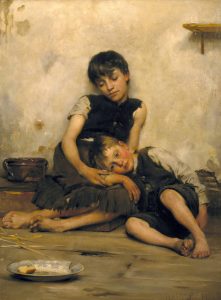
My brothers and sisters, I know you’ve heard this before, but stop playing favorites! Do not try to blend the genuine faith of our glorious Lord Jesus, the Anointed One, with your silly pretentiousness.
If an affluent gentleman enters your gathering wearing the finest clothes and priceless jewelry, don’t trip over each other trying to welcome him. And if a penniless bum crawls in with his shabby clothes and a stench fills the room, don’t look away or pretend you didn’t notice—offer him a seat up front, next to you. If you tell the wealthy man, “Come sit by me; there’s plenty of room,” but tell the vagrant, “Oh, these seats are saved. Go over there,” then you’ll be judging God’s children out of evil motives.
My dear brothers and sisters, listen:
God has picked the poor of this world to become unfathomably rich in faith and ultimately to inherit the Kingdom, which He has pledged to those who love Him.
By favoring the rich, you have mocked the poor.
And, correct me if I’m wrong, but isn’t it the rich who step on you while climbing the ladder of success?
And isn’t it the rich who take advantage of you and drag you into court?
Aren’t they the ones mocking the noble name of our God, the One calling us?
Need I remind Jerry Falwell Jr. that the very first book in the Bible spotlights God Almighty saying this?
I make you trustees of My estate, so care for My creation and rule over the fish of the sea, the birds of the sky, and every creature that roams across the earth.
[Translation: The Voice]
Looking Closer at Wonder Woman
My hopes:
- That Wonder Woman is one of those rare comic-book films that capture and hold my attention by questioning whether the glorification of violence is the way to celebrate true courage, conscience, and conviction.
- That Wonder Woman subverts the idea that masculinity is defined by muscularity and "fighting good."
- That Wonder Woman offers a woman of conscience and wisdom that counter the typical materialistic definitions of female beauty.
My fear:
- That it's just going to show how a woman can win by playing the same kind of violent one-upsmanship games that men play (and that men erroneously think demonstrate real superiority).
I'll share my thoughts on Wonder Woman when I've seen the film, but until then, here are some worthwhile reviews that dig deeper than assessments of "fun" and "refreshing." I can't say they've persuaded me that I'll come away with my money's worth. But they aren't discouraging me from seeing it either.
Vic Thiessen (at Vic & Walter Thiessen - On Movies):
Wonder Woman has been hailed as a victory for feminism. Much of the film might be viewed that way. However ... showing that a woman can fight as well as any man is not, in my opinion, a victory for feminism and is at odds with all of the other strengths depicted in someone like Diana (intelligence, compassion, courage, etc.).
And how do you reconcile an anti-war message with the use of endless violence to show that war is wrong (killing people who kill people to show that killing people is wrong)? Where is Diana’s reflection on, or even awareness of, the fact that she is trying to achieve her noble ends through horrific evil means? Redemptive violence is an almost inevitable feature of superhero films, so I rarely comment on it anymore, but when it is used in a film that tries to challenge redemptive violence (in this case, war), it must be named. Outside of the Tobey Maguire Spider-man films, superhero films seem to be almost completely unaware of this problem. The fact that Wonder Woman has scenes which display some awareness (e.g. Diana’s confrontation with one of her enemies near the end of he film) only makes the inconsistency harder to understand.
Wonder Woman repeatedly asks the question of whether people are innately evil. Diana refuses to believe it. Good for her. But this theme is explored all too briefly and resolved in a very simplistic manner, highlighting my disappointment with a film that is often hugely entertaining and tries to say good things but is full of confusing mixed messages and has no convincing overarching story, at least from a moral point of view.
Steven Greydanus at Decent Films:
Screenwriter and comic-book writer Allan Heinberg, working from a story co-written with Snyder and Jason Fuchs, invests Princess Diana with possibly the most genuinely heroic characterization of any modern cinematic superhero: a selfless champion of compassion and moral duty who fights for those who cannot fight for themselves.
But he's not entirely sold on the film. (He gives it a 'B.')
If Diana transcends the cynicism and nihilism with which Snyder imbued the first two DC universe movies, the movie is sometimes more cynical than it should be. At times Diana seems so naïve the movie threatens to become an allegory of blind faith, or even lost faith. Other times it seems cynical modernity is on trial. The resolution of these ambitious themes is more thoughtful than I expected, if less than fully satisfying.
Willow Maclay, at Curtsies and Hand Grendades, seems overjoyed by the way the film stands in stark contrast to other superhero movies:
Diana wants nothing more than to grow up like her Aunt Antiope (Robin Wright) & become a warrior, but her mother, Queen Hippolyta (Connie Nielson), is wary of her daughters interest in swords and shields. Hippolyta shows nothing but compassion for her young daughter, and strives to make her learn that being bloodthirsty and craving the battlefield is not a romantic or righteous goal. It was essential in the creation of this movie to tap into Wonder Woman's true empathy and sincere love for others and in these opening moments on Themyscira a guidebook is created for the character and within her origin her compassion is passed down from mother to daughter and from the creators of the film into the movie itself. This runs in direct contrast to the DC Comics more recent superhero fare which saw Superman break necks and Batman torture prisoners. Wonder Woman is a breath of fresh air and a closer companion to the sincerity of the Christopher Reeve Superman vehicle of the 1970s.
If you want to see just how looking at movies as "culture wars" can rob you of the joy of moviegoing, check out this misguided rant. Sounds like somebody needs an intervention.
[Check back for more reviews. I'll add 'em as I read 'em.]
The Unknown Girl (2017)
Before I talk about two brothers from Belgium and review their impressive new murder mystery — The Unknown Girl — I'm going to step up on my soapbox and talk about heroes and villains.
Harry Potter and Luke Skywalker have always been, for me, the least-interesting characters in their own franchises. Temperamental Hermione is more fun to watch than the boy whose most interesting characteristic is a lightning-bolt scar. And Luke, well... he's never as much fun as Han Solo, who gets to be bad. Even Darth Vader is a more compelling character, for how he behaves with such theatrical brutality and such destructive power. And who doesn't suffer through these Alien sequels and prequels just counting the minutes until those drooling, snarling Xenormorphs start wreaking havoc?
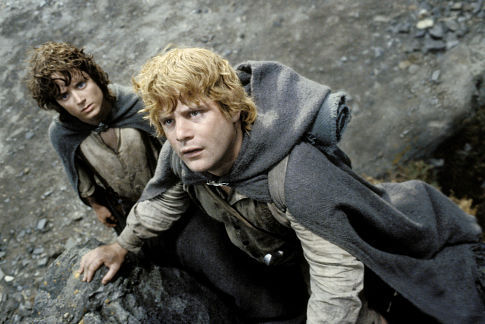
Villains and antiheroes — they're easy to write, easy to imitate, easy to illustrate. They're wild. Unpredictable. Flamboyantly ignorant. Expressively hateful. We can't take our eyes off them as they break rules, cross lines, and destroy things that were built with love and hard work. They dominate our attention when they're onscreen.
Unlike heroes, right? Truly heroic characters respect the rules. They show patience, kindness, humility, and generosity. They contribute small but costly efforts to the building of something greater than themselves. They suffer and soldier on. Truly heroic figures are boring — unless we grant them the freedom to use deadly force. More often than not, we recognize a hero on a movie poster by the weapon in his hand — that's the compromise we've made so that heroes can be exciting to watch.
On rare occasions, though, we catch a glimpse of a better way to tell stories of heroes. On rare occasions, artists put their imaginations to work to reveal this truth: The greater show of strength is the display of restraint, the choice not strike back, the choice to slowly build instead of swiftly destroy.
Once in a while, a filmmaker shows us how to do to this. And I've just seen a vivid demonstration that, yes, it can be done. It couldn't come at a more important time.
For those who have asked when I'm going to get around to reviewing Marvel's Logan or Guardians of the Galaxy Vol. 2, I submit this tired reply: I don't think I will. I'm tired of the whole addicting spectacle, the poisonous lie that good violence deserves cheers when bad violence strikes.
Perhaps it has something to do with getting older, with seeing how real-world villains bring about so much heartache, how they tear down such beautiful and meaningful things. Watching the news right now, it feels like I'm watching "The Villain Show." The greedy, the arrogant, the cruel, the bigots, the racists, the violent — they seem to have seized control of the land of "liberty and justice for all." Call me when you see a leader who wears the armor of integrity and conscience, who comes armed with nothing but truth and love.
•
And with that, I recommend to you, with wholehearted enthusiasm, a compelling hero of conscience and care: Doctor Jenny Davin, played by Adèle Haenel, in the Dardenne brothers' latest film — The Unknown Girl.
Doctor Jenny Davin is one of those rare characters who proves that a protagonist can be conscientious, humble, empathetic, quiet... and compelling. And by describing her in public, I feel like I'm probably doing my part to bury this movie. Seriously, am I making you want to see the movie by saying these things?
Jenny is the sort of doctor who makes house calls to the poor and the disabled around troubled neighborhoods in Liege, Belgium. Yes, the Jean-Pierre and Luc Dardenne are inviting us back to the scene where they have imagined so many masterful stories. (For my money, they're the most consistently impressive filmmakers working in the world today).
Jenny is principled, hard-working, and she holds those around her to high standards. And therein lies a subtle character flaw, the one that will set the story into fast and anxious motion. Right away we can see that what she preaches to her intern — "Don't let emotions get in the way" — is not necessarily the best law to live by. Part of what's so interesting about the point upon which this story turns is that it's so incidental: In the interest of demonstrating how to work in a principled fashion, she fails to perceive a need within her coworker; and, more importantly, she keeps the door closed against a stranger in urgent need.
As Hannah McGill (Sight and Sound) writes,
There’s something breathtaking about this moment, both in terms of what it recognises about human interconnectedness — that an impulsive moment of mean-spiritedness can have monumental consequences — and what it reveals about the Dardennes’ storytelling. Jenny’s state of mind at the beginning of the film — stressed, hectoring, slightly sadistic towards her mild-mannered charge — is unexplained in terms of its specific spurs, but wholly familiar nonetheless: we’ve all been there.
The devil, for Doctor Davin, is in the details of her professionalism. But she's not designed to defend herself, even here, where she could easily make a reasonable case for her behavior. When she finds out that one simple act of reasonable workplace management has cost a woman her life, she cannot rest. She will do whatever she can to make amends, even if it means putting her life in danger.
And so she — like the panic-stricken factory worker played by Marion Cotillard in Two Days, One Night (the Dardennes' last film) — dashes from place to place, person to person, trying to learn all that she can about the woman who died. Why? Does she think she can bring her back? Can she right the wrong that was — let's face it — not particularly wrong? Can she do anything to settle her raging conscience about the tragedy of this "unknown girl"?
[This review is made possible
by the generous support
of the Looking Closer Specialists,
whose contributions keep this site online
and make my work as a reviewer possible.]
Along the way, Doctor Davin becomes one of the most admirable champions of conscience and hands-on healing I've seen in all of cinema. In what seems to me to be the Dardennes' most Bressonian film — call it Diary of an Urban Priest — there is power in the humble hands of this soft-spoken priestess of medical science. Embracing a style even more spare than usual, the Dardennes seem to pull back from their tendency toward cleverly poetic composition and symbology. Here, the gist is in the gestures. Whether Jenny is listening to someone's troubled lungs, holding someone as they bow their heavy head, or receiving their confession, she commands our attention.
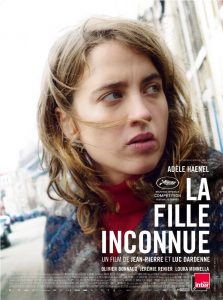 As Jenny, Adèle Haenel captures and holds our attention in her ponderous silences, speaking volumes with her expressive eyes and her tendency to strike the pose of a Marian icon, Around her, the Dardennes have organized something of an all-star reunion party: Olivier Gourmet is frightening (and almost unrecognizably grizzled); Jérémie Renier is another walking disaster of conflicting impulses; and Thomas Doret and Morgan Marinne show up as well — and look, they're all grown up!
As Jenny, Adèle Haenel captures and holds our attention in her ponderous silences, speaking volumes with her expressive eyes and her tendency to strike the pose of a Marian icon, Around her, the Dardennes have organized something of an all-star reunion party: Olivier Gourmet is frightening (and almost unrecognizably grizzled); Jérémie Renier is another walking disaster of conflicting impulses; and Thomas Doret and Morgan Marinne show up as well — and look, they're all grown up!
On first viewing, The Unknown Girl feels a little long; the first half of the movie has a certain meandering quality, taking a long time to set the stage for the intense, suspenseful turns of the second half. And it isn't a particularly sophisticated detective story. As Jake Cole (Slant) observes, the good Detective Doctor Davin "never seems to follow a bum lead, and everyone she questions has some connection to the crime." It is here that I miss the more complex compositions of the Dardennes' earlier films which have proven to be such rewarding subjects of study. (The Son is the film I most look forward to sharing with students in my film classes, because we'll go on talking about its brilliance almost every day we're together.)
But my take differs from Cole's: I didn't find it boringly "deterministic." As Jenny's troubles rise from a ripple to a raging boil, I eventually experience that familiar Dardenne-movie state of emotional exhaustion and exhilaration by the conclusion, a gentle epilogue that strikes me as one of the most tender and beautiful moments in recent cinema. I half-expect to find that, on a second viewing, the first hour won't seem long at all, but that it will reveal, as the Dardennes' films usually do, all kinds of subtle greatness at work.
What's more — I'm so stunned to see such a rare celebration of humility, courage, and true heroism on the big screen that I'm not going to miss this opportunity to sing its praises. Magnificent and timely, The Unknown Girl is challenging me take my eyes off of the soul-bruising abuse happening in the headlines hour by hour; it's reminding me to return to the unglamorous but heroic work of patient, diligent, disciplined love for those who need it most.
•
[I saw The Unknown Girl at the Seattle International Film Festival.]
My Box of 64: Ep. 3 – Getting Into Character
On the third episode of the new Looking Closer audio journal, My Box of 64...
I write to my muse, Thomas, with comments on the new Netflix series — Abstract: The Art of Design, the new Terence Davies film about Emily Dickinson called A Quiet Passion, and Guardians of the Galaxy Vol. 2.
Then I welcome a special guest: Christine Marie Brown, one of Seattle's best and busiest actresses.
 Immediately following Brown's intense performance in a Taproot Theatre play, we plunged rather spontaneously into a deep-dive, unscripted, unplanned conversation about the work of acting and its potential as an avenue for cultivating empathy (within the actress and the audience).
Immediately following Brown's intense performance in a Taproot Theatre play, we plunged rather spontaneously into a deep-dive, unscripted, unplanned conversation about the work of acting and its potential as an avenue for cultivating empathy (within the actress and the audience).
- Does an actor change as she inhabits a character?
- What are the rewards and dangers of "getting into character"?
- Consider all of the other lives an actor — or almost any artist — must live in order to sustain a life of imagination and artistry. How does one draw all of these things together into a full, coherent life, rather than fragmenting into categories of "work," "art," and "play"?
- And what does Brown mean when she says that actors are "sin eaters"?
The good news: Christine Marie Brown is patient with my rather impulsive questions, and offers wisdom in response to all of them.
The bad news: We sat under a loud air-conditioning vent, so listeners may find that they have to crank up the volume to hear the conversation clearly.
By the way, Christine Marie Brown will star in a special performance of "An Evening With Dorothy Day" at my very own church — St. Paul's Episcopal in Seattle — on Saturday, June 3. If you're in town, don't miss it.
A Quiet Passion (2017)
The brilliant Terence Davies cast —
Cynthia Nixon in —
A Quiet Passion as the great —
Emily Dickinson.
The poet's played by Emma Bell —
In the opening scenes —
Where Emily embraces doubt —
And authenticity.
But then — the wonder of the sight —
family portraits change! —
These younger Dickinsons evolve —
To a wiser, troubled age.
And so her life unfolds in all —
Its angst and honesty —
Her faith a discipline of truth —
And nonconformity.
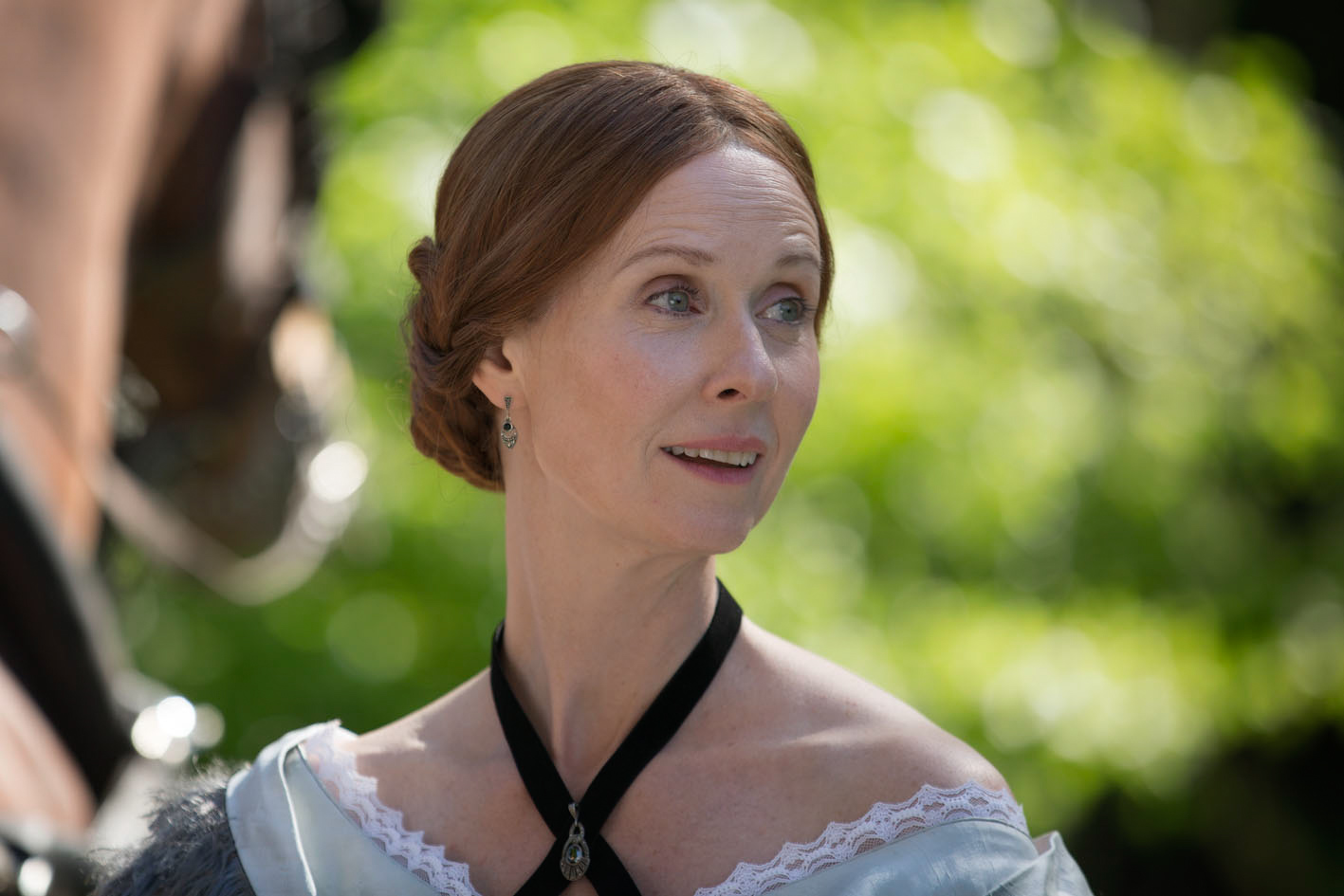
But do we understand her art —
Through Davies' haunted lens? –
Are we given the secrets to —
These poems of Dickinson's?
At times it seems (it's no surprise) —
That Davies chose this muse —
So he could voice his own complaints —
On church and death — his views.
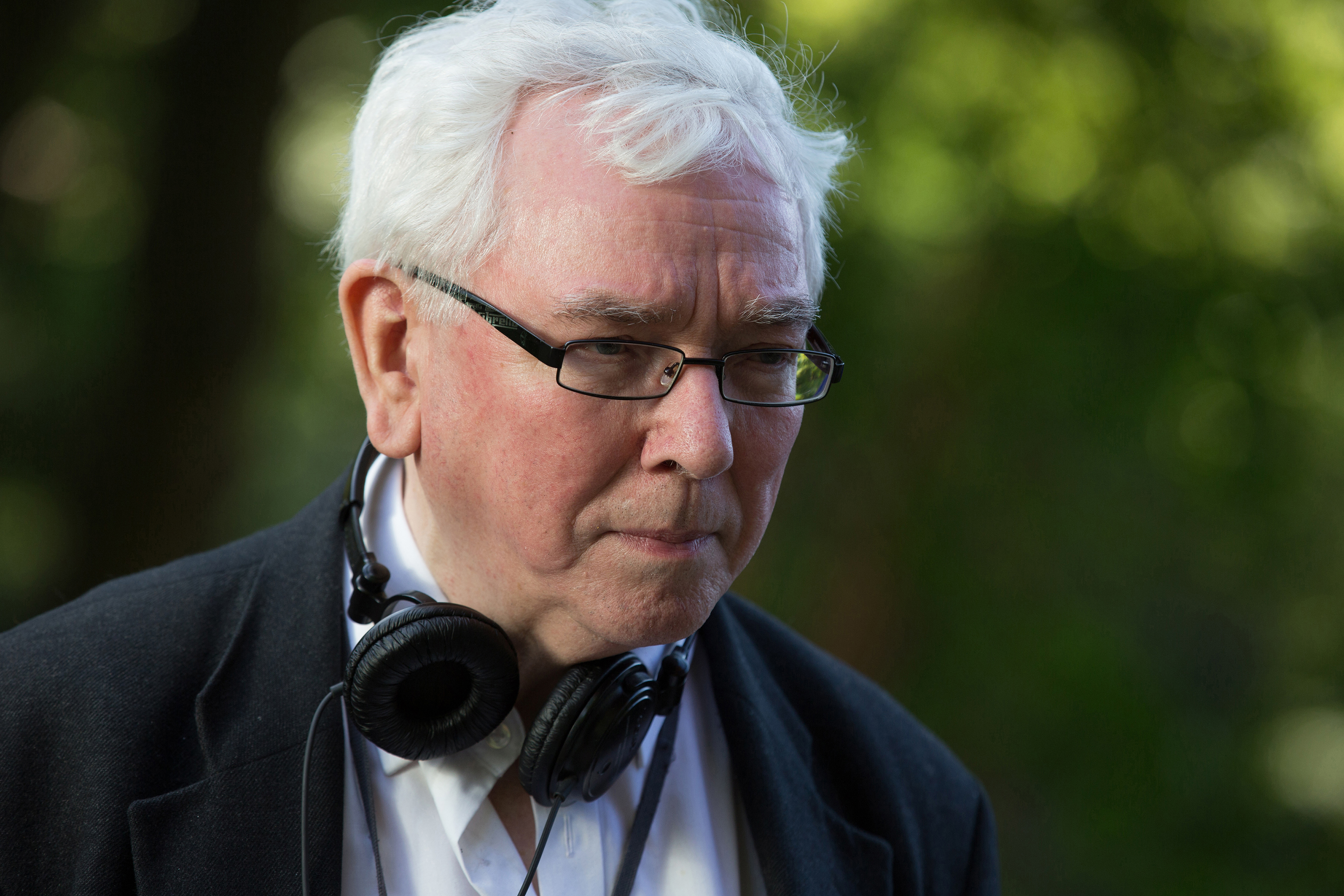
Nevertheless and insofar —
As he is true to her —
Davis gives us a Dickinson —
Prophetic and mature.
All praise to Nixon, so immersed —
Within the role she took —
She disappears and it is clear —
That she is not a crook!
(Sorry.)
But seriously, in an ideal world —
The Academy would save —
An Oscar for this actress now —
She earns all praise and raves.

At heart, this film is less about —
The art of poetry —
And more about life lived for truth —
And not mere piety.
This Emily — her soul's her own —
She will not acquiesce —
To patriarchal arrogance —
Or feign subservience.
And thus, self-righteousness becomes —
A danger to her art —
Thank God for Jennifer Ehle who,
As Vinnie, owns the part.
Dear Vinnie, she's the sister —
In whom the poet confides —
A voice of conscience she becomes —
Against Emily's pride.

And so a complex portrait shines
Through Davies' misty eyes —
A singular biopic, oh! —
A glorious surprise.
Does this stand up with Davies' best?
Not quite, but close, I'd say —
The Long Day Closes tops the list
On Davies' résumé.
But yes, A Quiet Passion is —
Better than Sunset Song —
That melodrama's pathos, well —
It ran a little strong.
So get thee to the theater —
And watch Brave Emily —
By her truth-telling earn the name —
Guardian of the Galaxy!
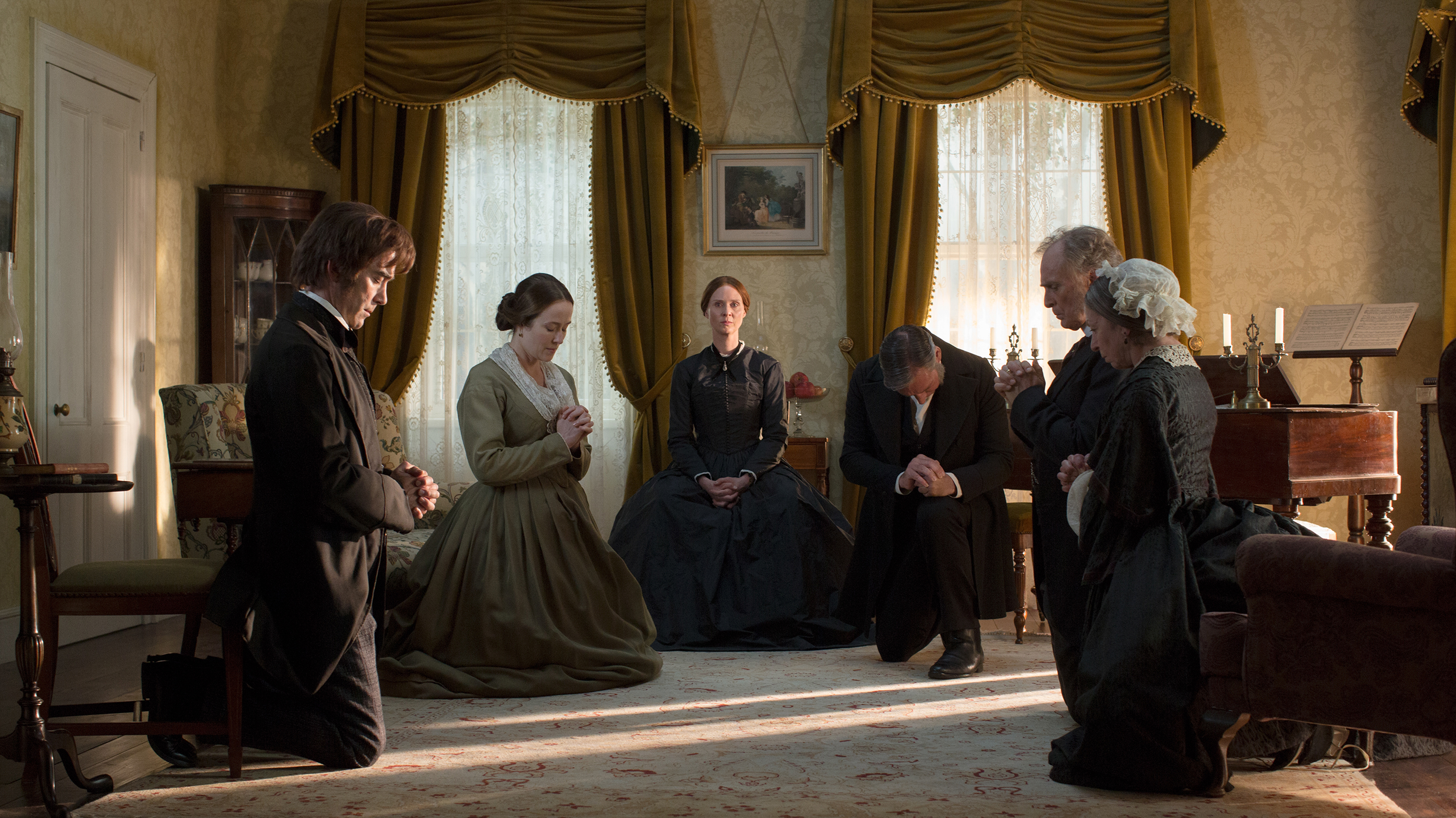
Footnote:
If I'd have questioned Davies —
On this screenplay, I'd have said —
Why did you give Ma Dickinson _
Lines from Joyce's "The Dead"?
Personal Shopper (2017)
Just as Olivier Assayas's new film Personal Shopper keeps shapeshifting from horror movie to socio-economic commentary to erotic thriller to paranormal murder mystery... so this review keeps shifting as I write it. I haven't published my comments until now because I couldn't figure out where to begin in describing all that this movie might be "really about." It opens so many possible paths of interpretation, offers so many interesting mysteries, and confounds so many genre expectations. I've tried and abandoned five approaches, all of them seeming insufficient.
Does this mean that the film doesn't hold together? Or does it mean that it's too unique and imaginative to easily describe? I can't decide. But for what it's worth, here they are.
1. Focus on the film's terrifying ghost story.
Personal Shopper tells the story of Maureen, a young woman who, grieving the death of her twin brother, eagerly awaits signs from beyond the grave that he is at peace.
Maureen, played by Kristen Stewart, seems confident that she will receive that visitation. Perhaps that's because she identifies as a medium. Is she? Can she communicate with the dead? The film doesn't give us any reason to doubt her on that claim; she certainly experiences something paranormal. But the film isn't interested in giving us answers about what, exactly, she's experiencing. Something comes to Maureen. Is it her brother? Is it a ghost? Is she mad?
Whatever signals she's receiving, they're not encouraging. Fearsome, distorted, the visions convey an amplified sense of Maureen's own obsessions — they're pained, even diseased, by unfulfilled longings and desperate unrest. They want something, and they're not happy.

Whatever we decide about Maureen's visions, we're right there with her in our anxiety. The mansion that serves as the setting of the film's freaky first act is so beautifully revealed that I wish the film had taken me back there for its finale, if only because it has some of the most glorious shadows and sounds of any big-screen haunted house I've experienced. As much as I love the ghoul-fraught CGI wonderland of Guillermo del Toro's Crimson Peak, I find this place much, much scarier.
2. Praise the director's agility.
A ghost story seemed, at first, like an unlikely project for the director of Summer Hours (2008), a magnificent drama about one age of art and culture giving way to a new one. It's one of the most beautiful dramas of the 2000s, a multi-generational story with several main characters, and one that was quickly awarded with inclusion in The Criterion Collection. By comparison, Personal Shopper can seem like a curiosity, a smaller endeavor focused almost entirely on one character's crisis.
But the more I reflect on what Personal Shopper is about, the more it makes sense that this would come from the same imagination. Borders seem to be Assayas's most recurring theme: generational, cultural, sexual. And his most compelling characters are those who seem trapped in a no man's land.
As a medium, Maureen is a border-crossing agent. She's a go-between, a middleman, a consumer who shops for someone other than herself. And that puts Assayas right where he likes to work. He's interested in a soul haunted by a lost intimacy, stuck in lonely pursuits of serving and communicating with others — living and dead — who are beyond her physical reach, and who, when she does see them, are only half present, distracted by conversations with others far away. At times, Maureen's desperation leads to furtive and desperate border crossing — putting on her boss's clothes when nobody's looking, consenting to dialogue with a stalker for the sake of having an attentive listener, fantasizing about a make-believe lover.
Whether chasing Maureen on her motorcycle (another choice that underlines her isolation), or watching her shop for her boss's next party dress or Cartier ornaments, or following her through the haunted mansion, cinematographer Yorick Le Saux makes this a convincing, unglamorous Paris. And in doing so, he and Assayas make the worlds of social media, high fashion, and ghosts overlap convincingly.
3. Rave about Kristen Stewart in the role of her career (so far).
Here, Stewart plays a revision on the character she played in 2015's Clouds of Sils Maria. Once again, she's a personal assistant who loses herself by supporting somebody else.
In Sils Maria, the job made a lot more sense: she was managing the life of a world-famous actress (played by Juliette Binoche), and the two worked together as a seasoned team. Here, Maureen works as an errand-runner for Kyra (Nora von Waldstätten), a self-absorbed celebrity who gives her nothing in return but a paycheck — not even eye contact. Thus, the title Personal Shopper becomes an oxymoron: Maureen's work benefits someone else, but there is nothing personal about it. She is a meaningless part of a consumer transaction, always longing to be someone else.
It's a self-effacing performance made of raw nerves. Maureen's insomniac eyes, her twitches, her bursts of needy dialogue and her long silences — these speak of someone who is unaccustomed to being seen, heard, trusted, or cared about. She dresses as though deliberately avoiding attention, as though oblivious to her own beauty. Thus, those few scenes in which we see her slip out of her clothes and into someone else's, the nudity comes as a shock. How can a beauty so embodied live so oblivious to herself, and devote herself to decorating a vain and cruel celebrity? And why does she live in a state of fracture, convinced of her incompleteness, longing for someone disembodied and seeming like she just might cross over to catch up with him?
Assayas seems inclined to pass La Binoche's crown to Stewart. He signaled this with Clouds of Sils Maria, by casting Stewart as Binoche's assistant. And here, he lures her into a few familiar moments — familiar because Binoche played similar scenes for director Michael Haneke in Code Unknown.
Watch for a shot on the subway in which Maureen, flinching under the abuse of a bully, sits on the Metro next to a man who bears a striking resemblance to Amelie's Maurice Bénichou. In Code Unknown, Bénichou — playing a benevolent subway-riding stranger in one scene only — stands up and defends Binoche's Anne from her assailant. Here, though, the man sitting beside Maureen remains oblivious of trouble. Maureen's attacker is invisible.
Much later, watch for the moment when Maureen realizes that she is really, really trapped, and she looks into the camera just the way Anne does in Code Unknown when she (in the film within a film) realizes that she's locked in.
(Huh. My wife's name is Anne Maureen. Does that increase my feelings of empathy and defensiveness on these characters' behalf? Never mind.)
4. Celebrate the film's cross-genre experimentation.
Perhaps you're wondering — how does a story about the glamour of showbiz become both a ghost story and a murder mystery?
You'll have to see for yourself. No wonder poor Maureen looks as though she's exhausted from playing the lead in several movies at once.
It's easy to empathize with Maureen, seeing that, as far as she knows, half her heart died when her twin brother crossed over. But it's also easy (unnervingly so) to see how possible it is to slip out of the world of in-person interactions and into a life of strange and ephemeral relationships. If we embrace this new world of digital communication, aren't we consenting to a life of disembodiment? Maureen's like a ghost herself, living without substantial human connections. Her boyfriend? We only see him as a pixellated image on a screen, and he's always appealing for her to join him in the flesh. Meanwhile, her sex life is all imagination and fantasy. She keeps her thoughts and feelings bottled up, unless a complete stranger asks — for some reason, that's a more comfortable option than friendship. For peace, she seeks communion with someone beyond the grave.
And yet none of these things quiet her longings — they only heighten her unease. The more Maureen bases her security on words that arrive from other dimensions (spiritual or digital), the more she's doomed to fracture when those bonds are severed. The more she fantasizes about who she wants to become, the more she seems doomed to never discover who she might become.
How can Maureen find wholeness again? Is she really so different than any of us and our myriad ways of scratching our neglected relational itches with feeble substitutes?
The movie doesn't have an answer for Maureen's questions, but it runs her past a lot of signs that read "Wrong Way." She goes from secretly dressing herself in the off-limits wardrobe of a celebrity to giving in to the appeals of an invisible stalker for the possibility of intimacy. It's as if losing her brother has made her too comfortable with the idea of communing with someone seemingly non-corporeal, until that Presence — or, perhaps, those Presences — prove unfriendly and far too capable of achieving real-world consequences.
5. Worry about the film's reflections on technology
My increasing sense of unease over the seeming essentiality of a "personal device" may have much to do with why I felt so gripped by Personal Shopper.
I resisted the gravitational pull of cell phones as long as I could. I wanted to save money, to live "off-leash," to avoid staring into my hand while walking, and to remain attentive to my surroundings. What's more — I knew that if I had a device in my hand that enabled me to connect with friends anytime, anyplace, I would use it all the time. I would struggle to protect my time and freedom.
And I was right. Now I feel chills when I hear that old Police song "Wrapped Around Your Finger." It's so easy to let these powerful technologies become a controlling force in our lives, while flattering ourselves that we are using them. This year in particular has shown me just how much I turn to the digital realm for peace of mind, only to end up more troubled than before. 2017 has been a year of daily damage, a relentless barrage of bad news about America's turn toward treason and tyranny, and its abandonment of "liberty and justice for all." How often have I lately found myself reaching for my smartphone in the hopes of finding relief — some good news, a message from a friend who isn't anywhere nearby, an alert that might bring consolation? As a result, I spend less in-person time with friends. I spend less time engaging great art and more time scanning social media. How addicted have I become to the adrenaline spike of posts about imminent threats? Why am I letting this unnatural access to so much of the world beyond my reach and experience bear such heavy influence over my spirit?
In a time when the Powers That Be are increasing their capacity to monitor us, to manipulate us, to catch us in their snares, Olivier Assayas's new horror movie works like a wicked charm.

